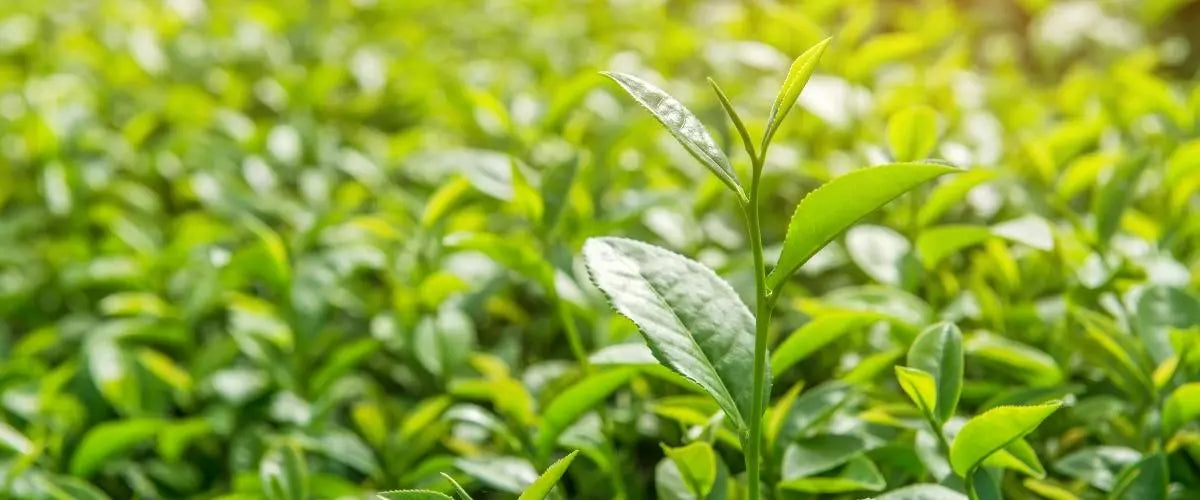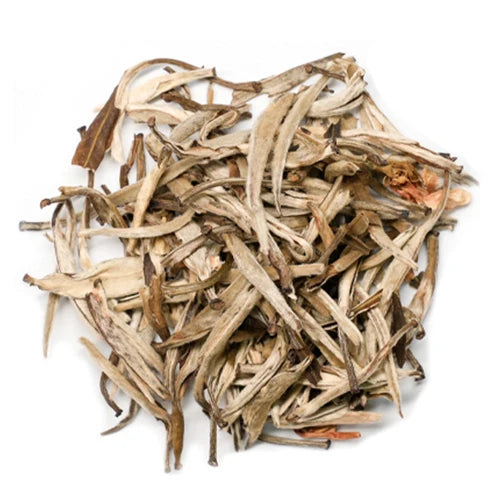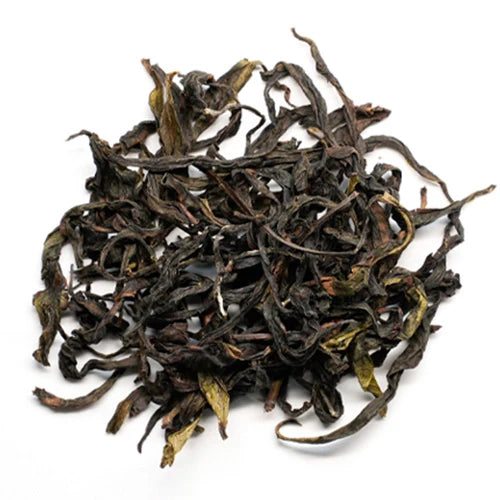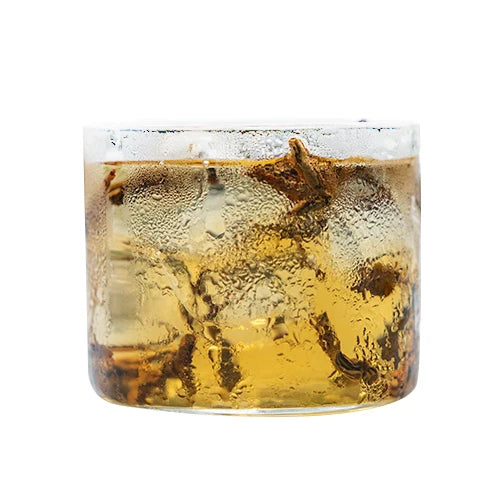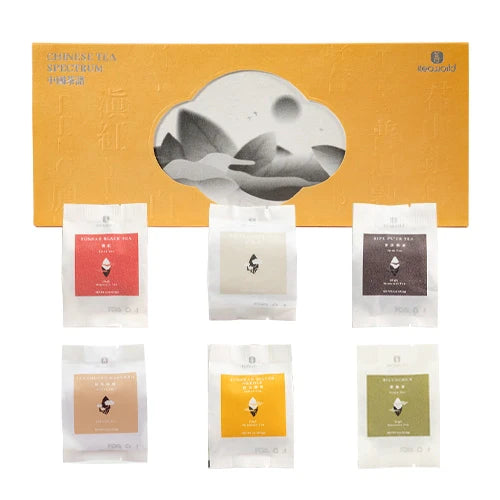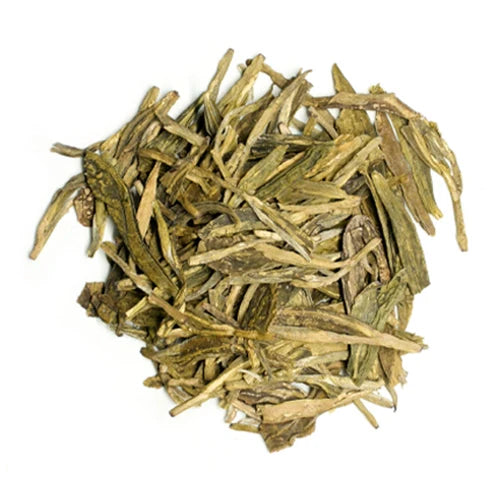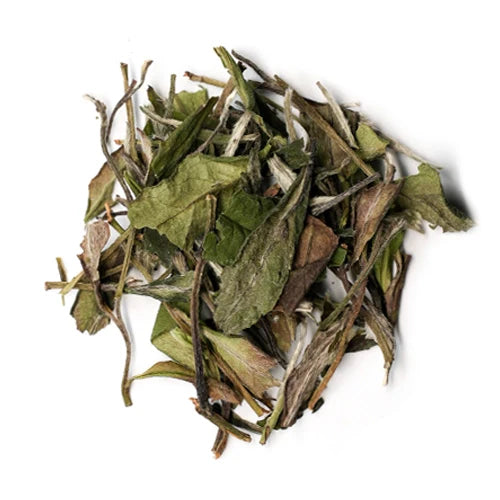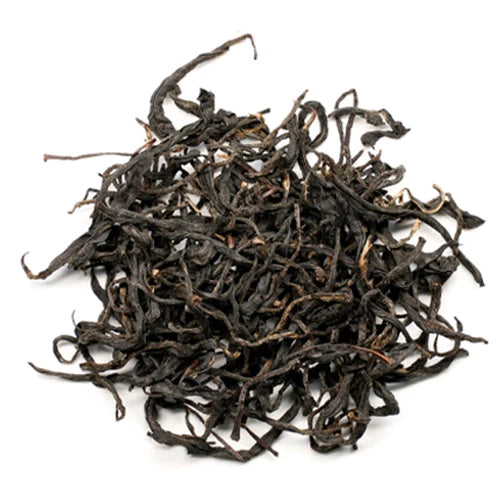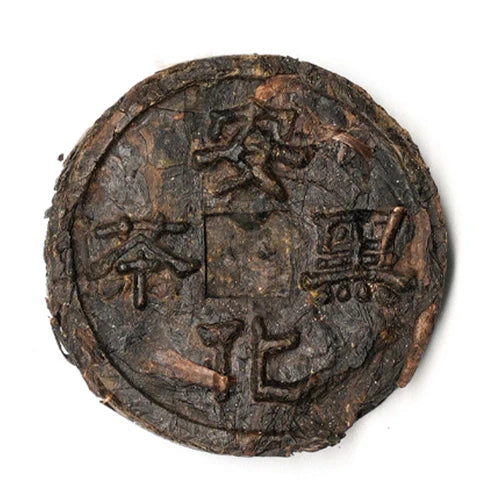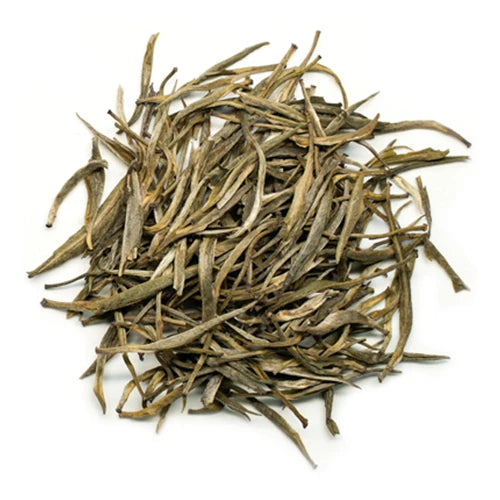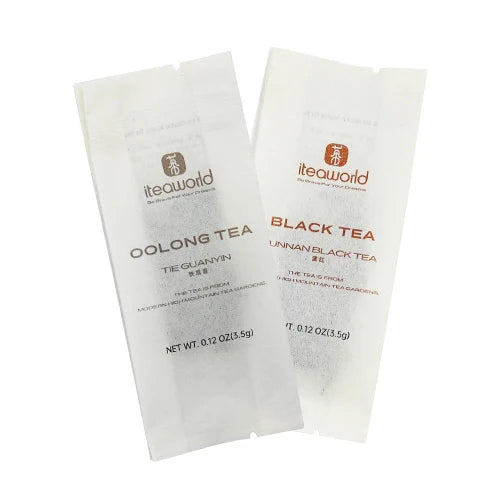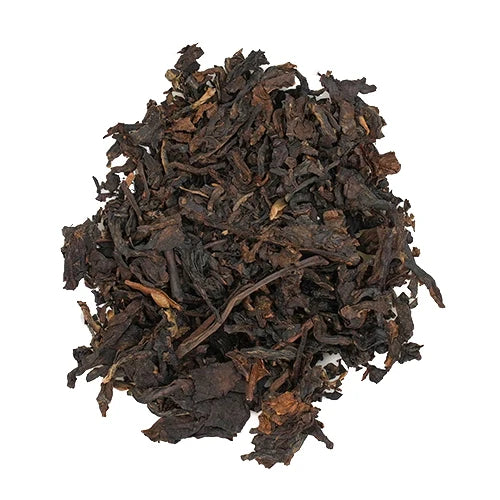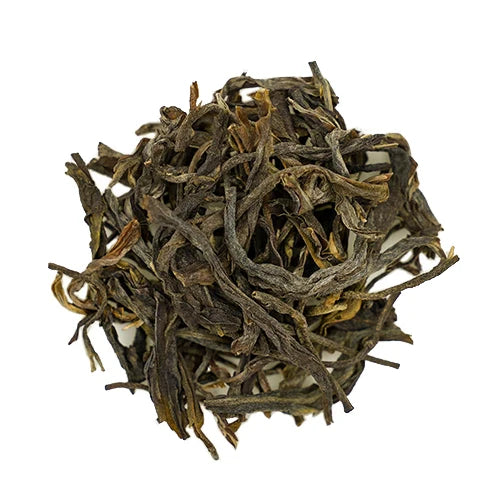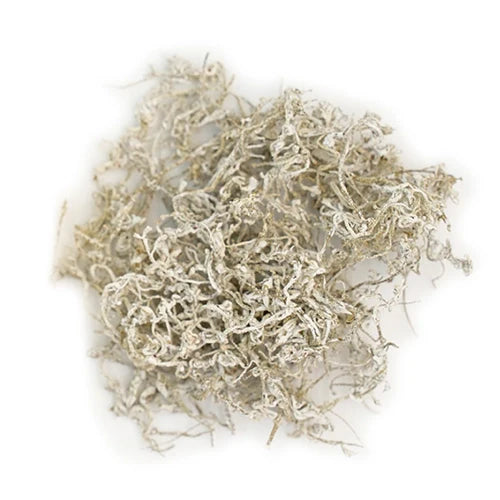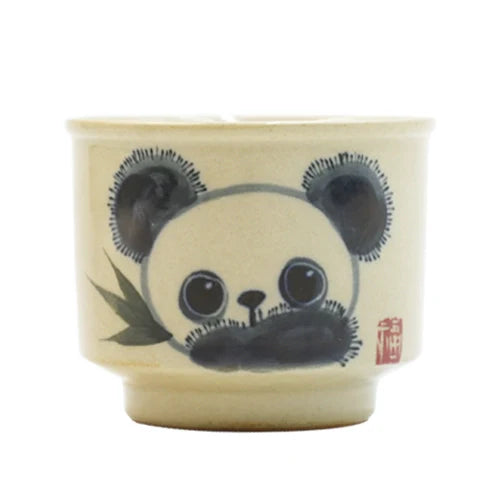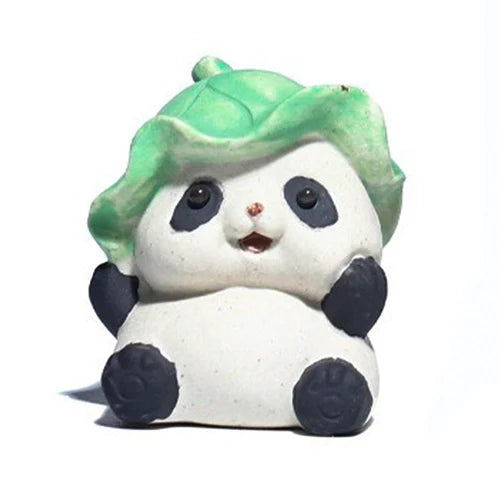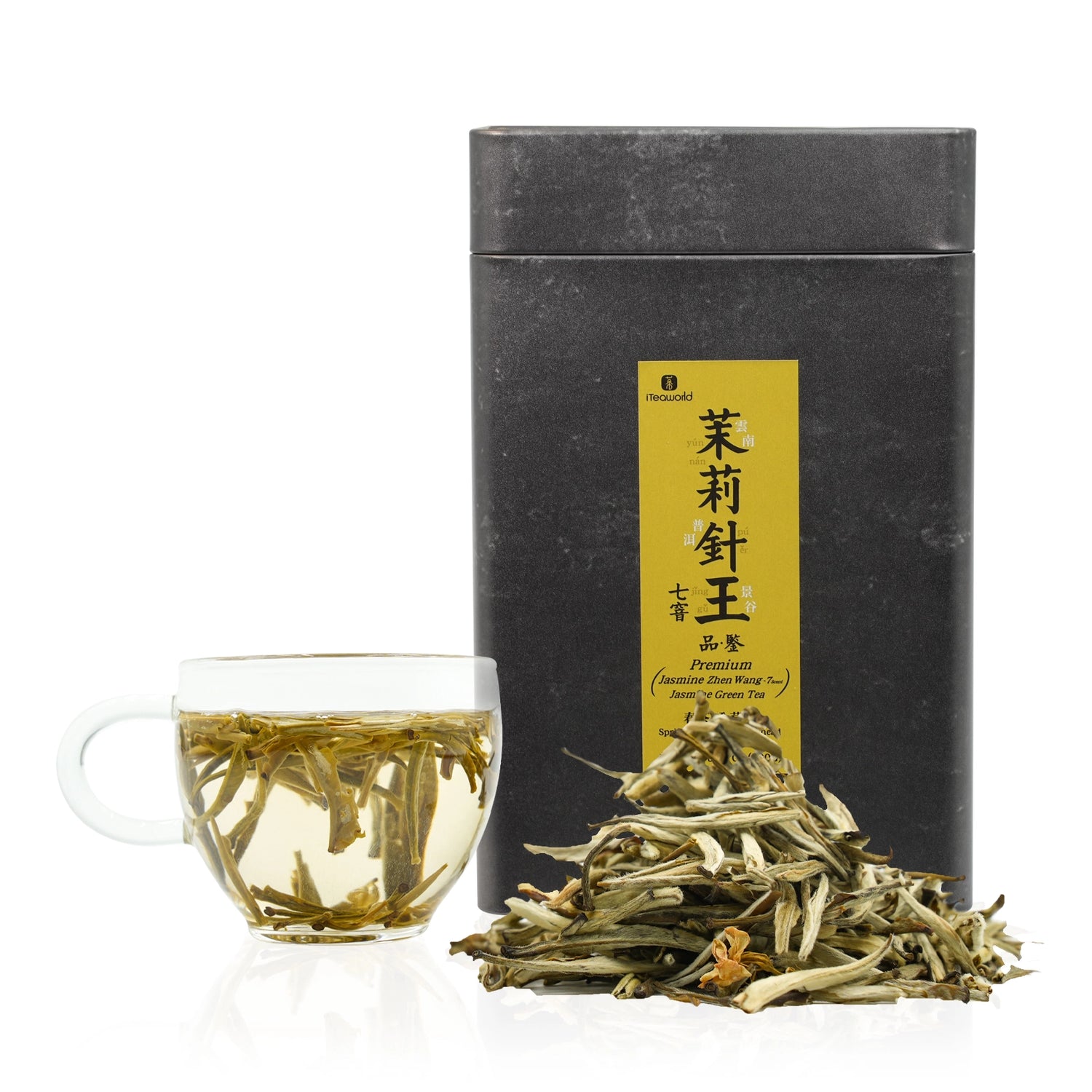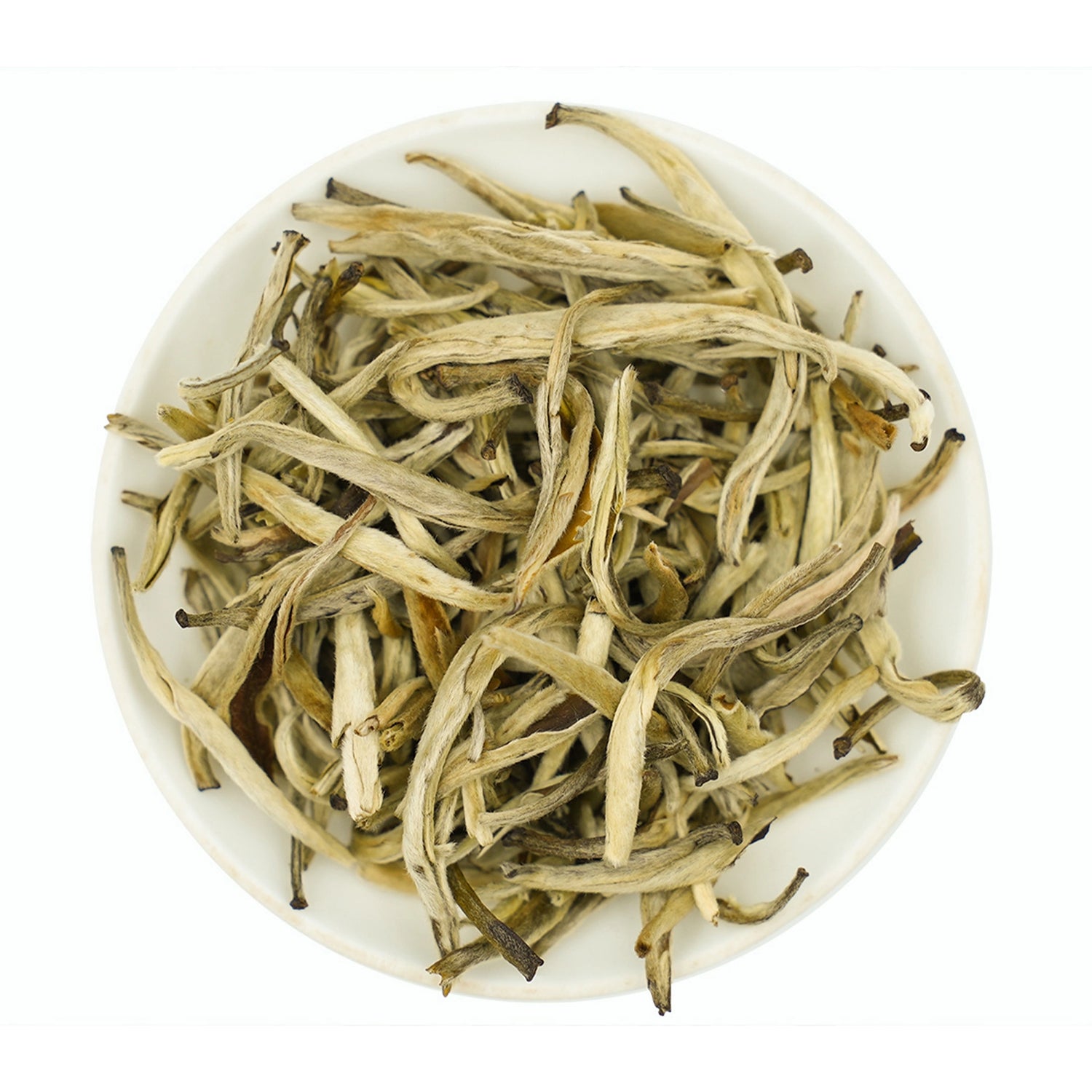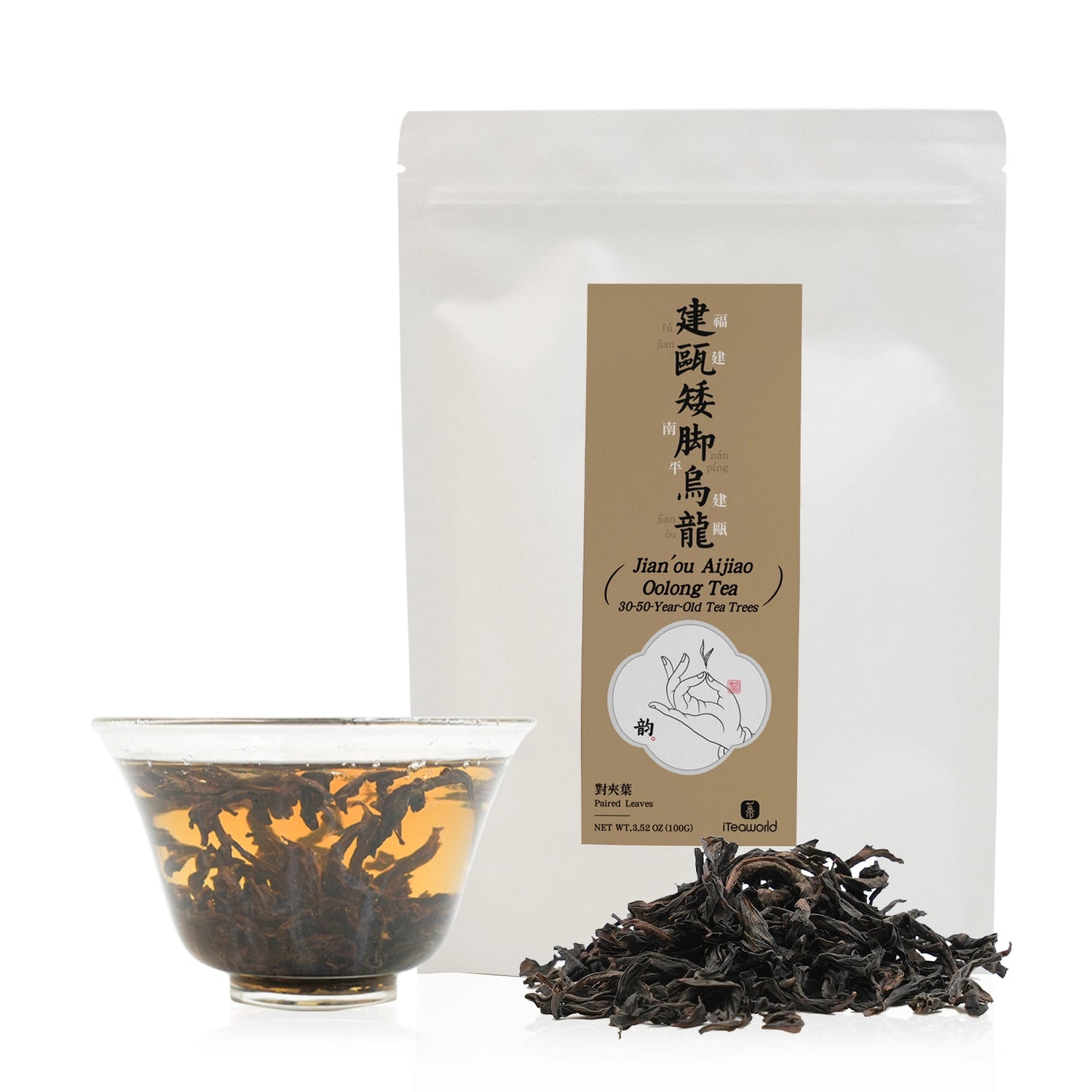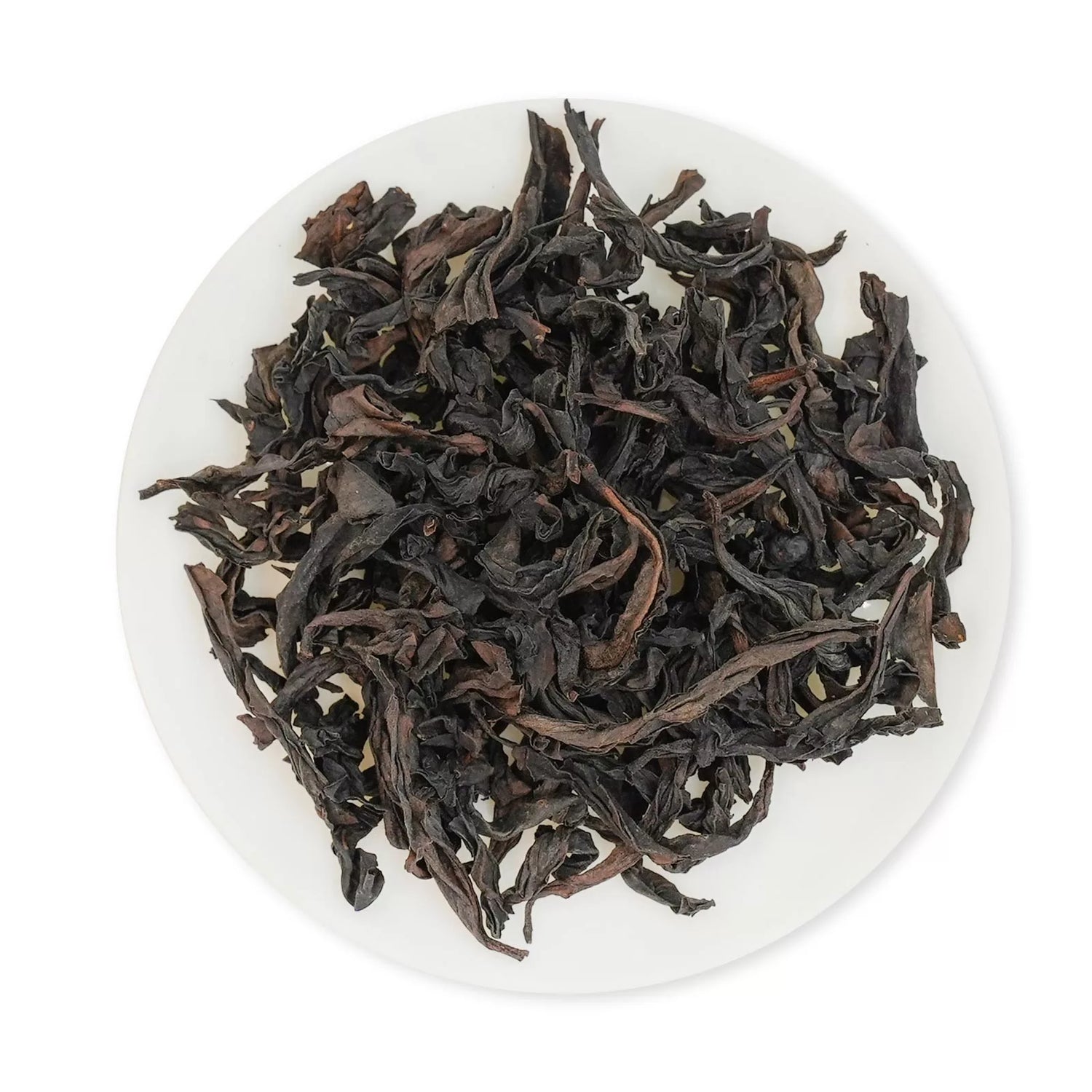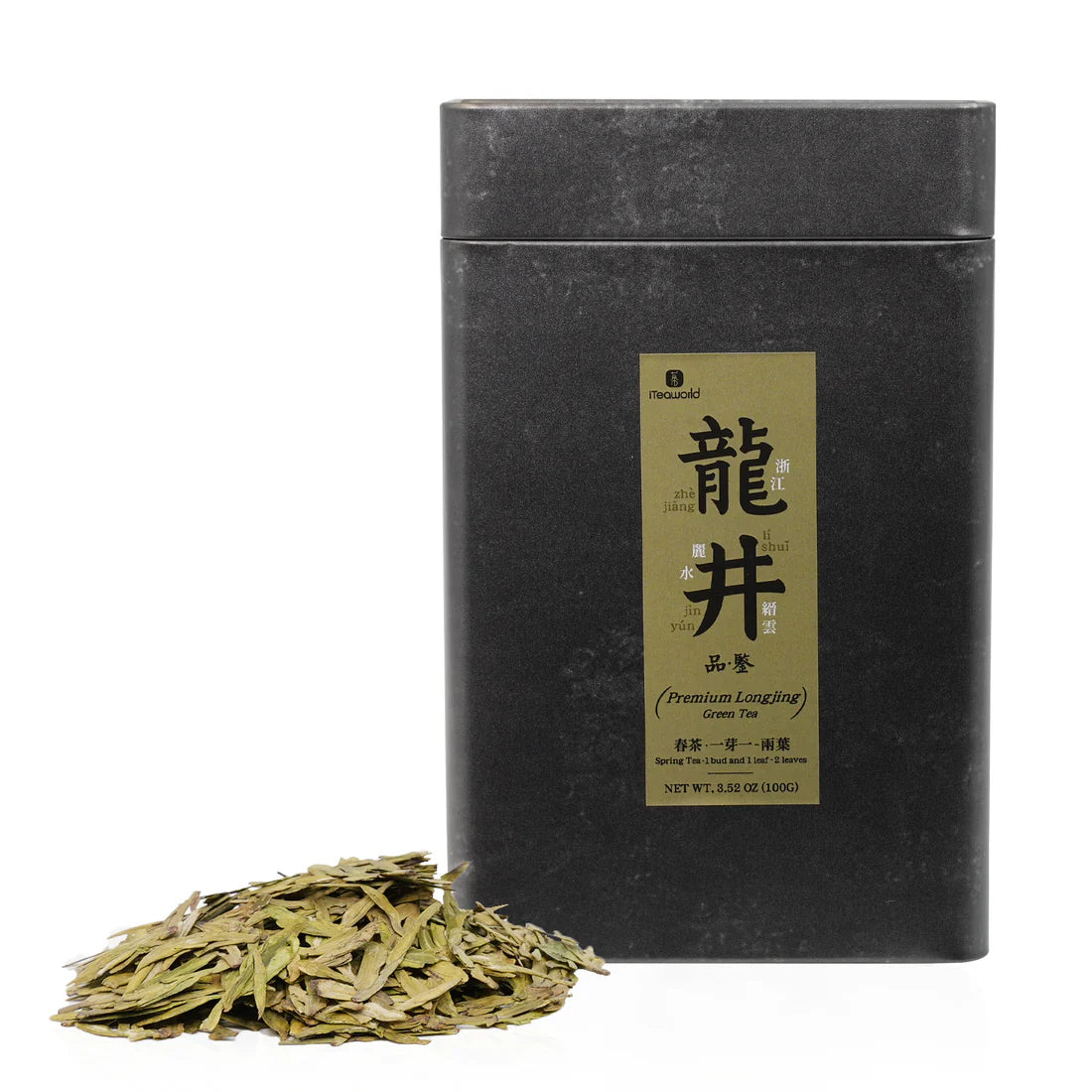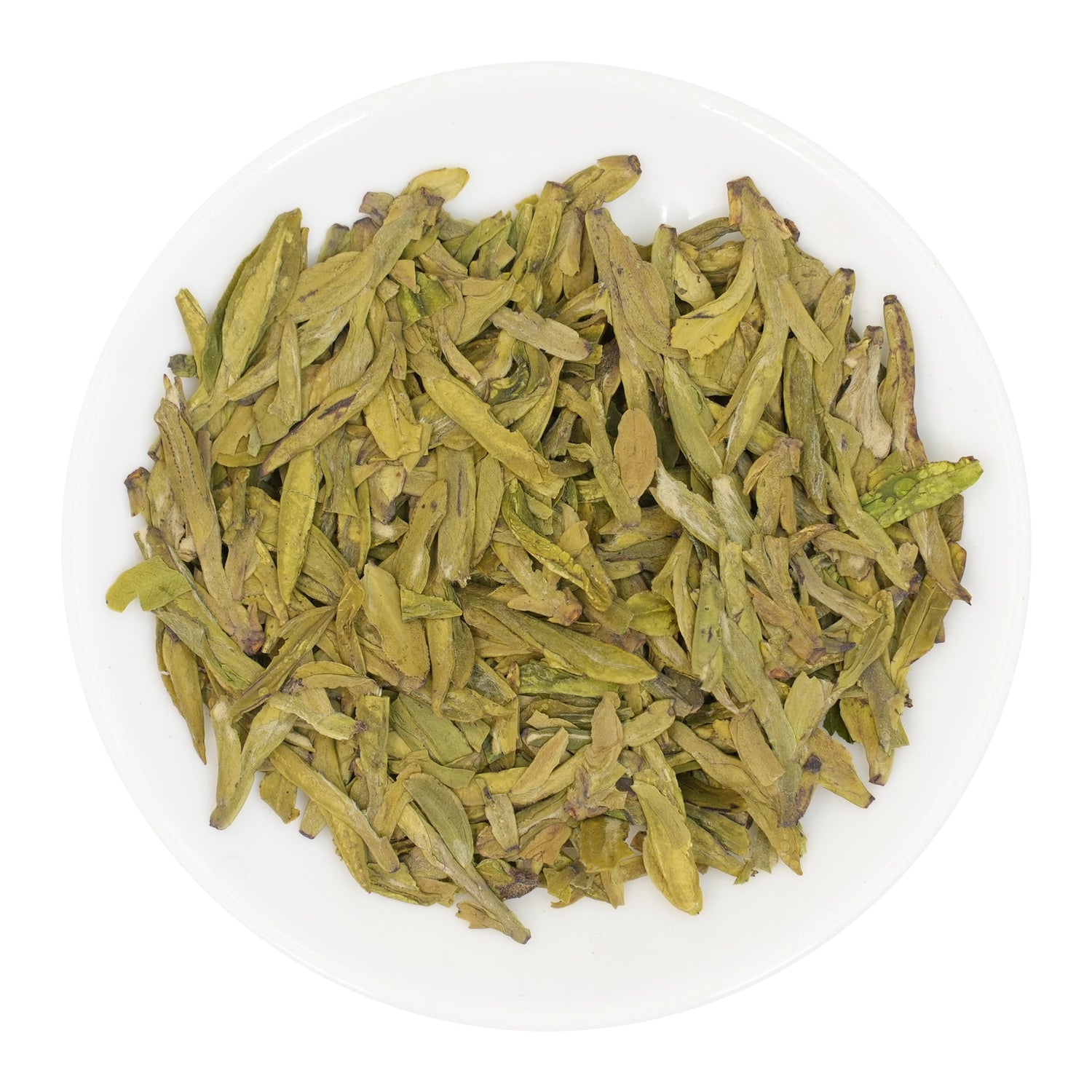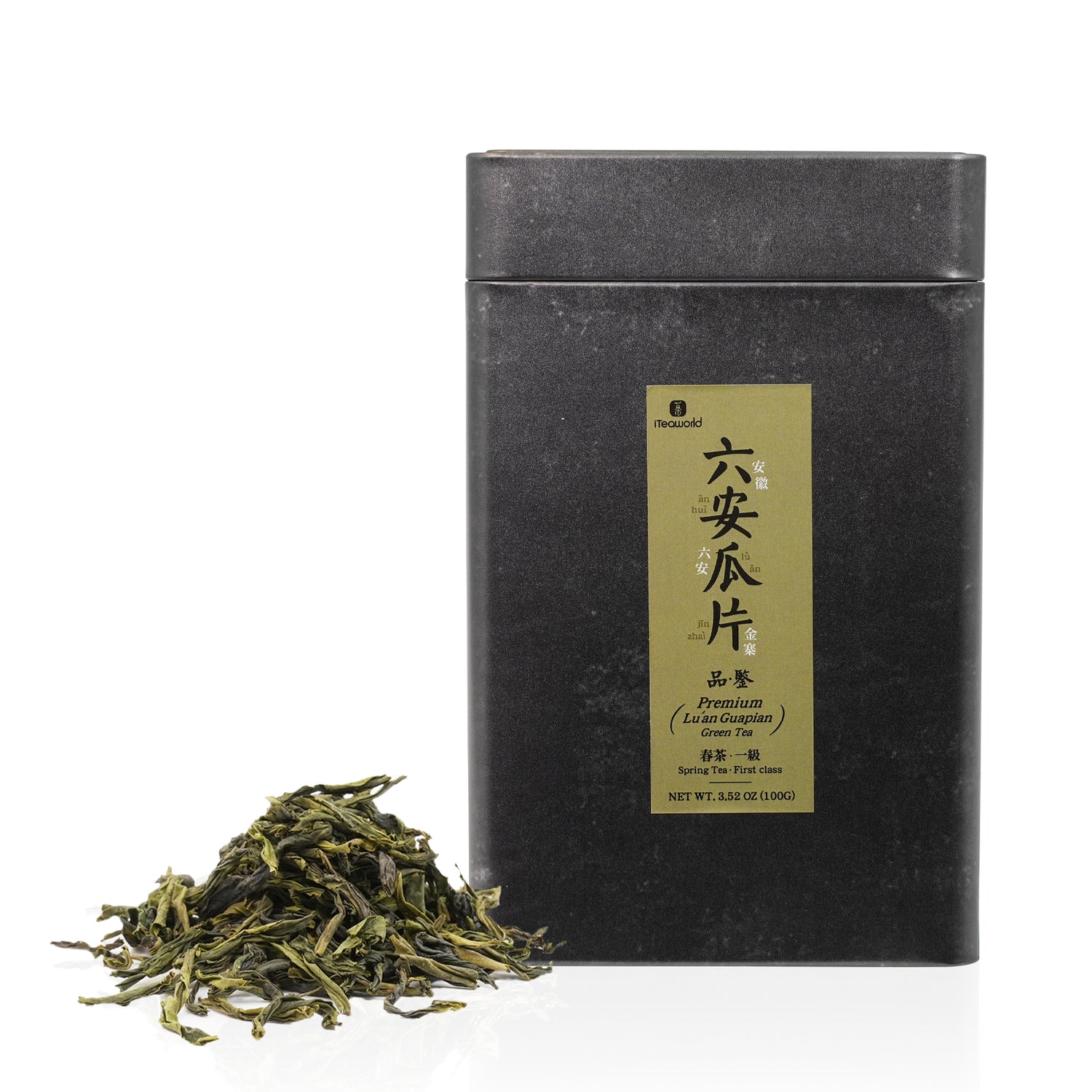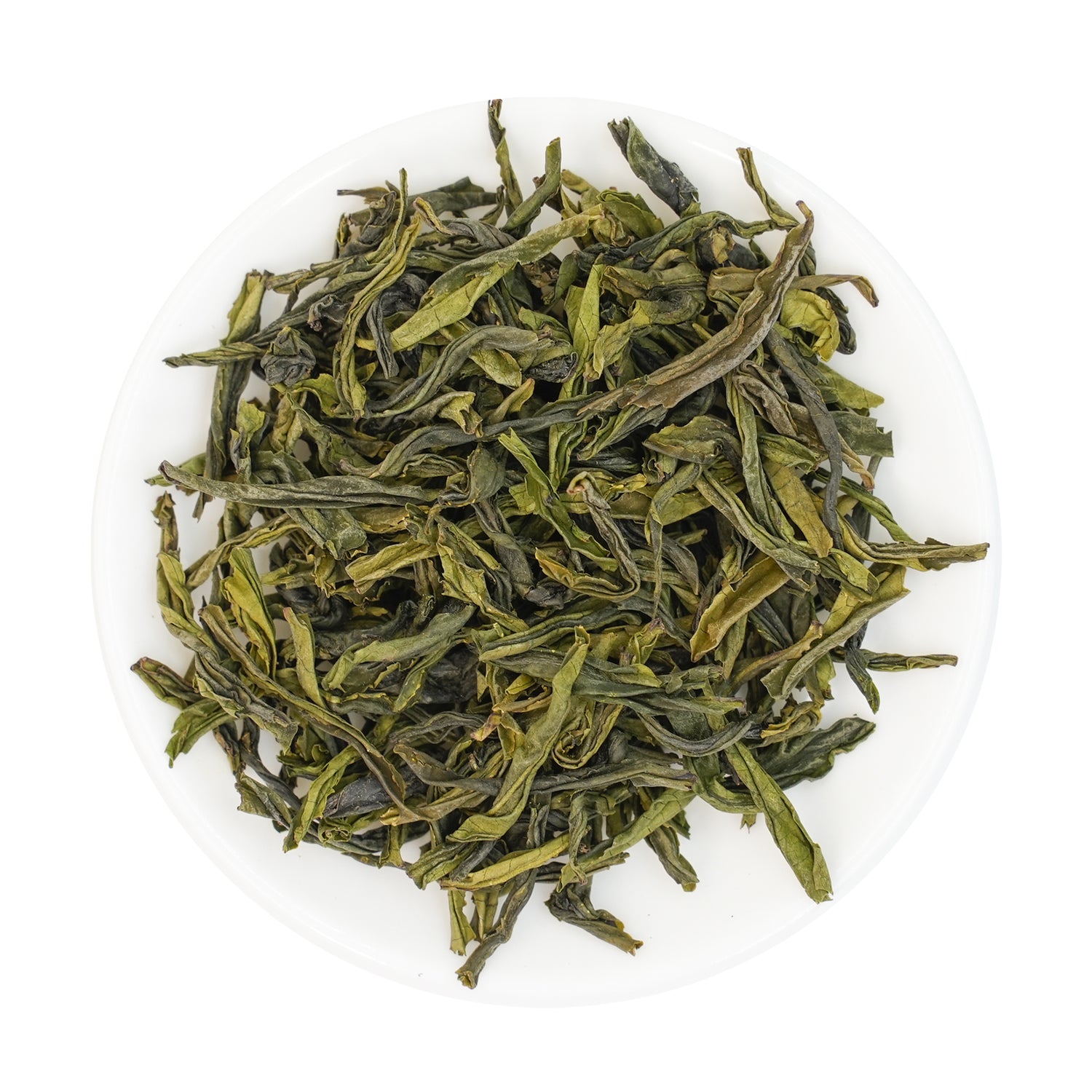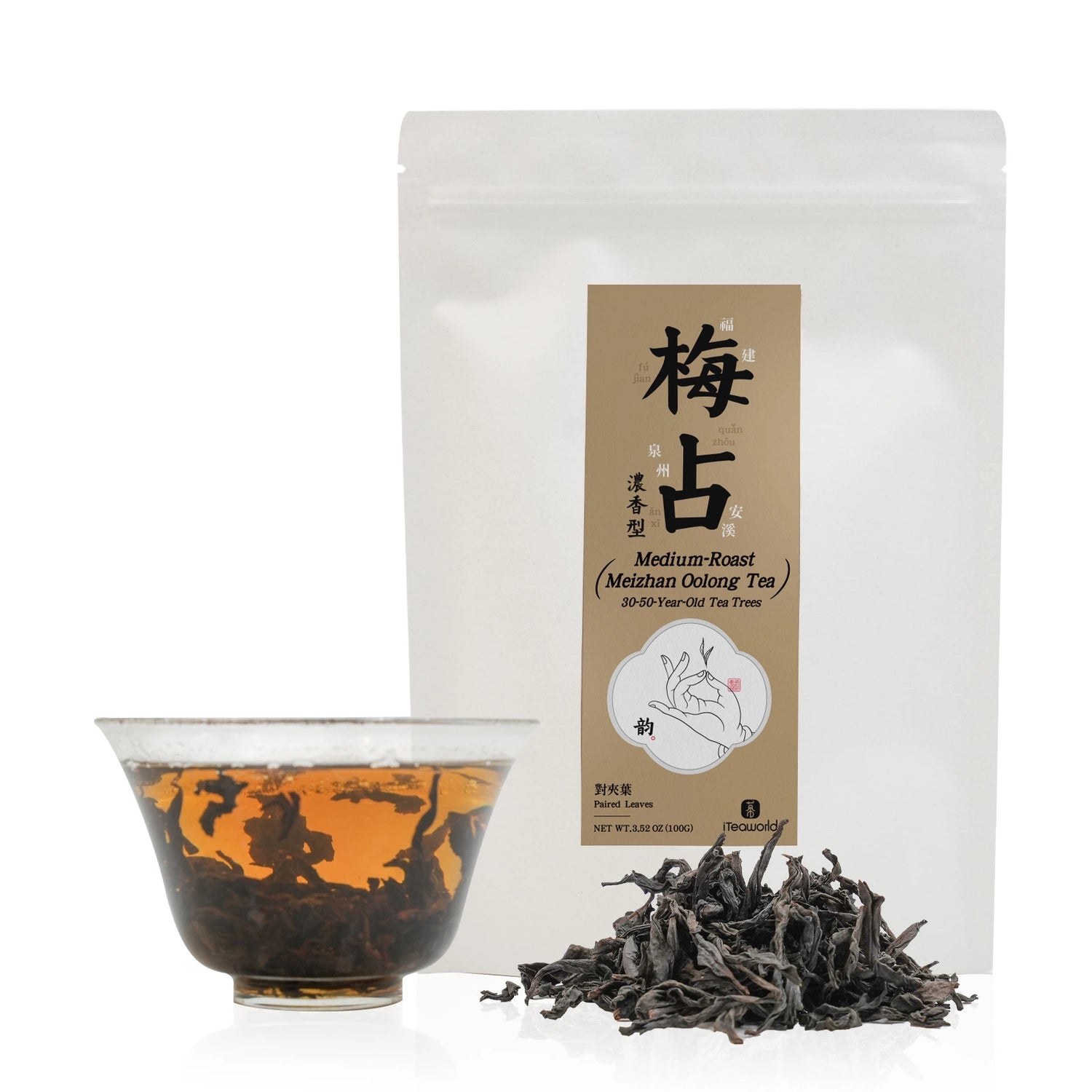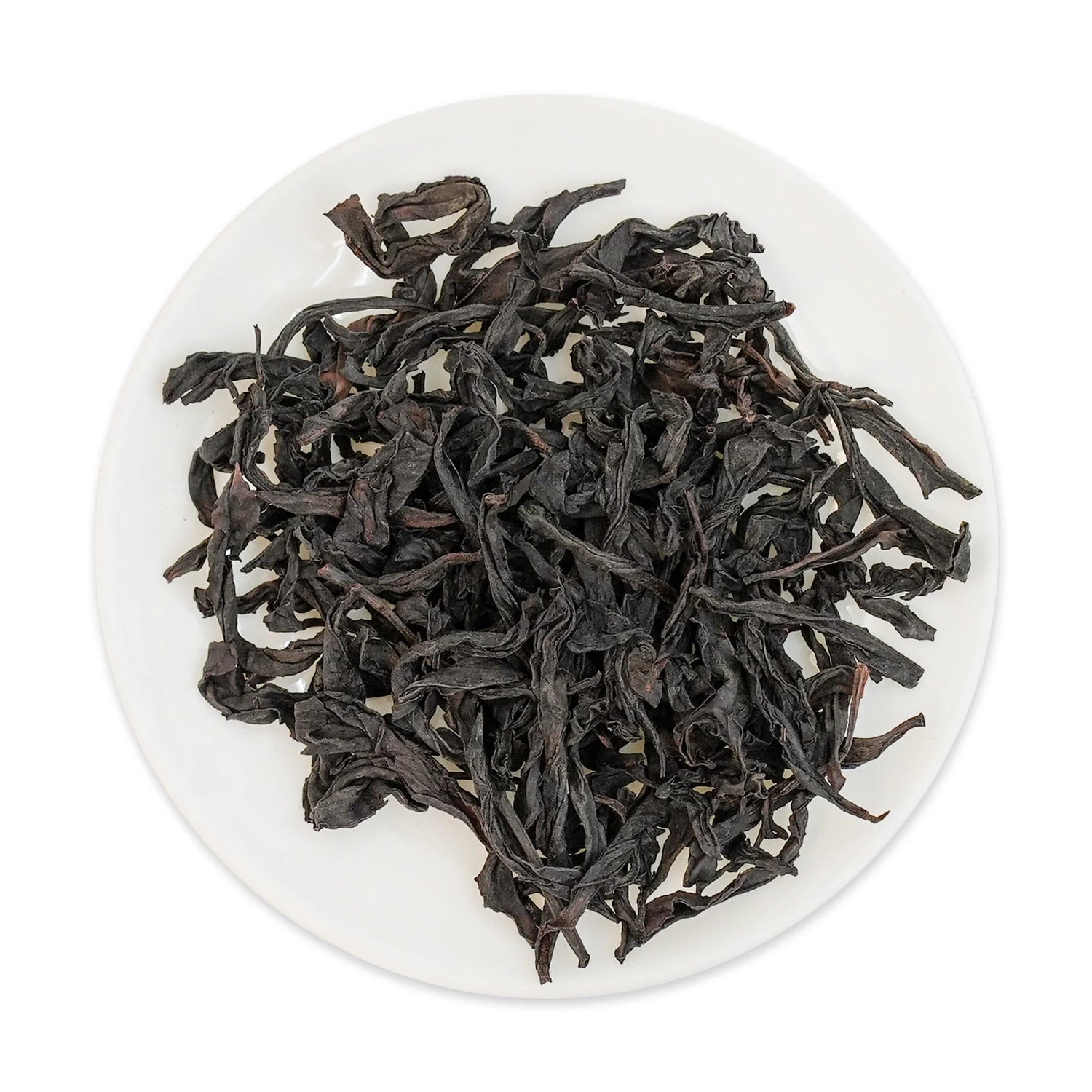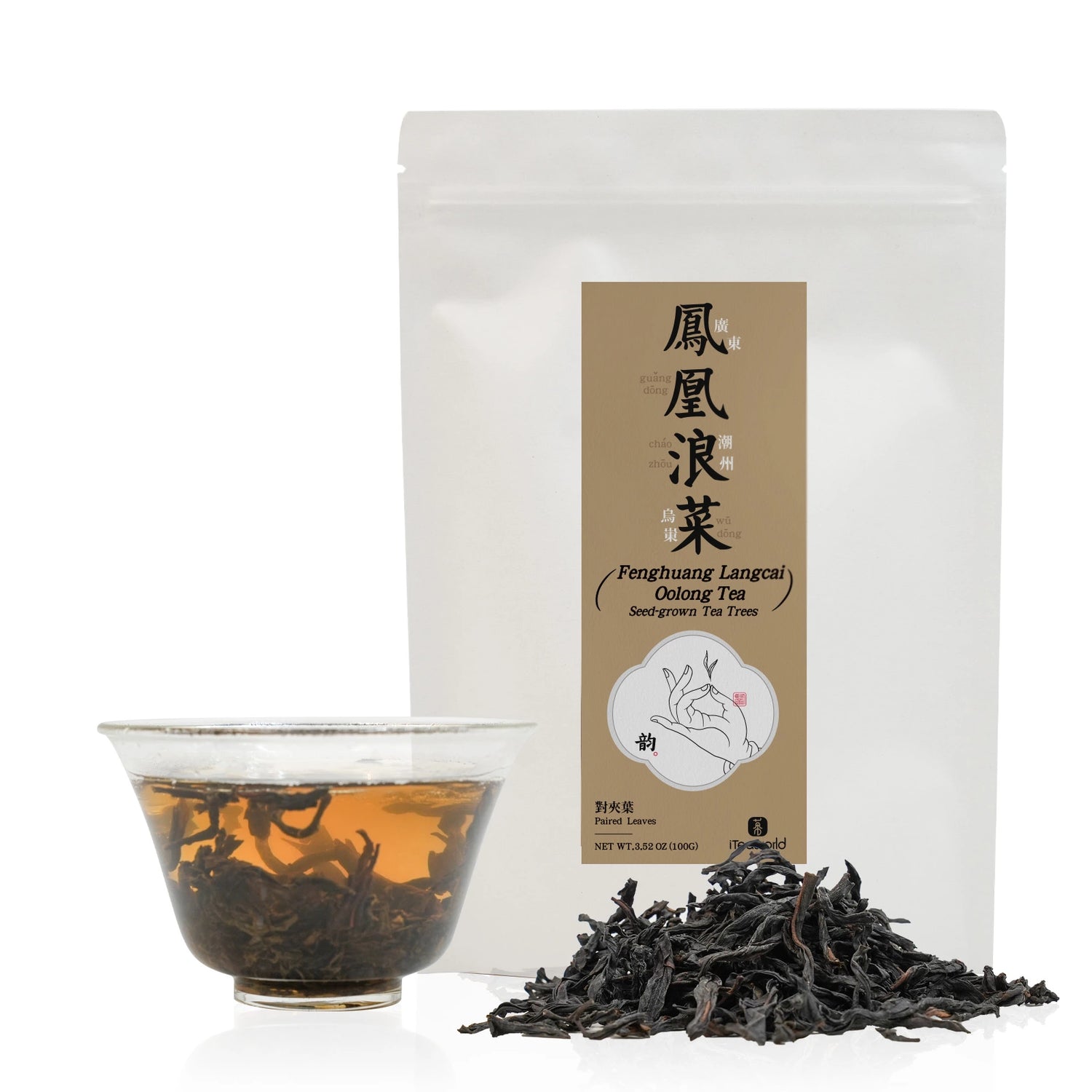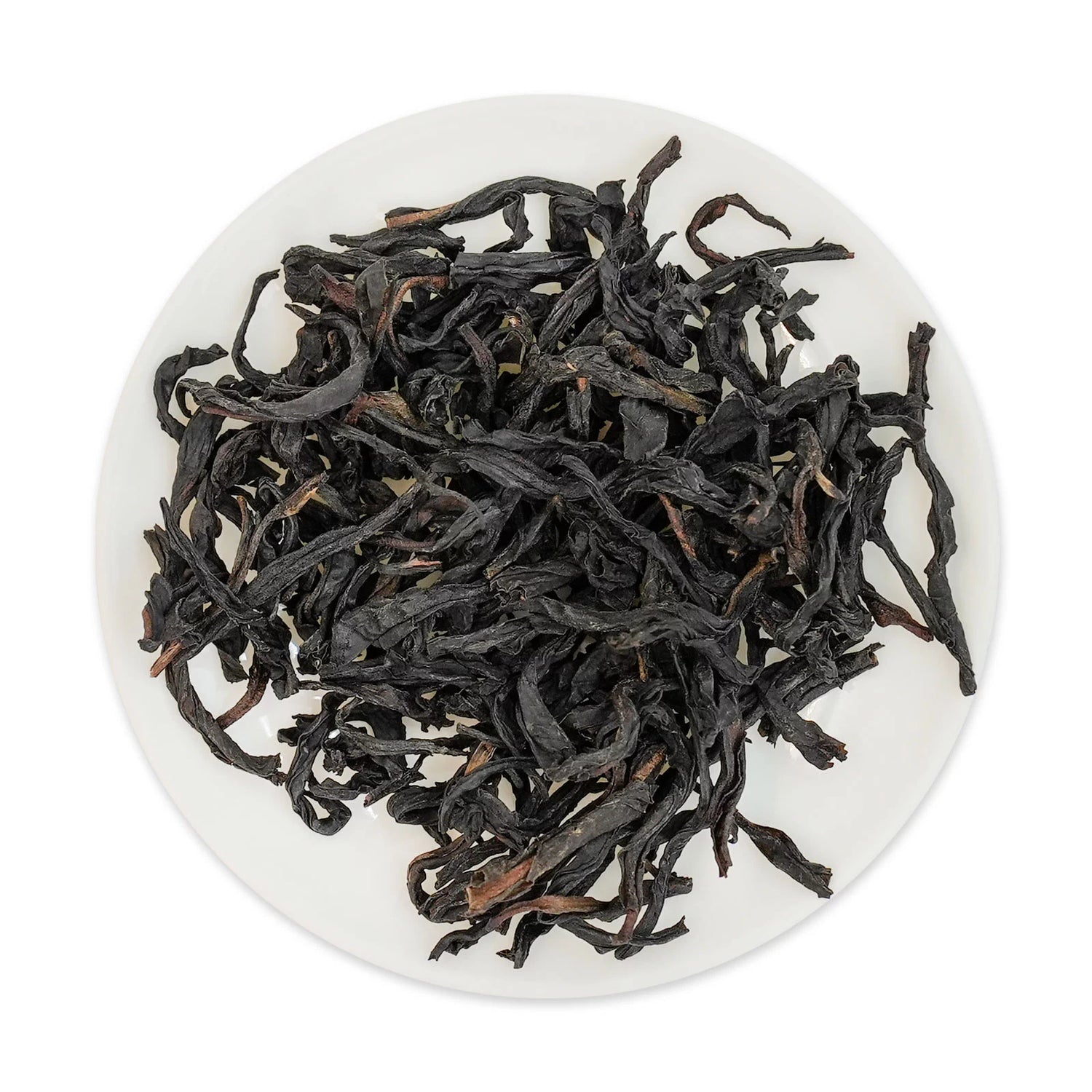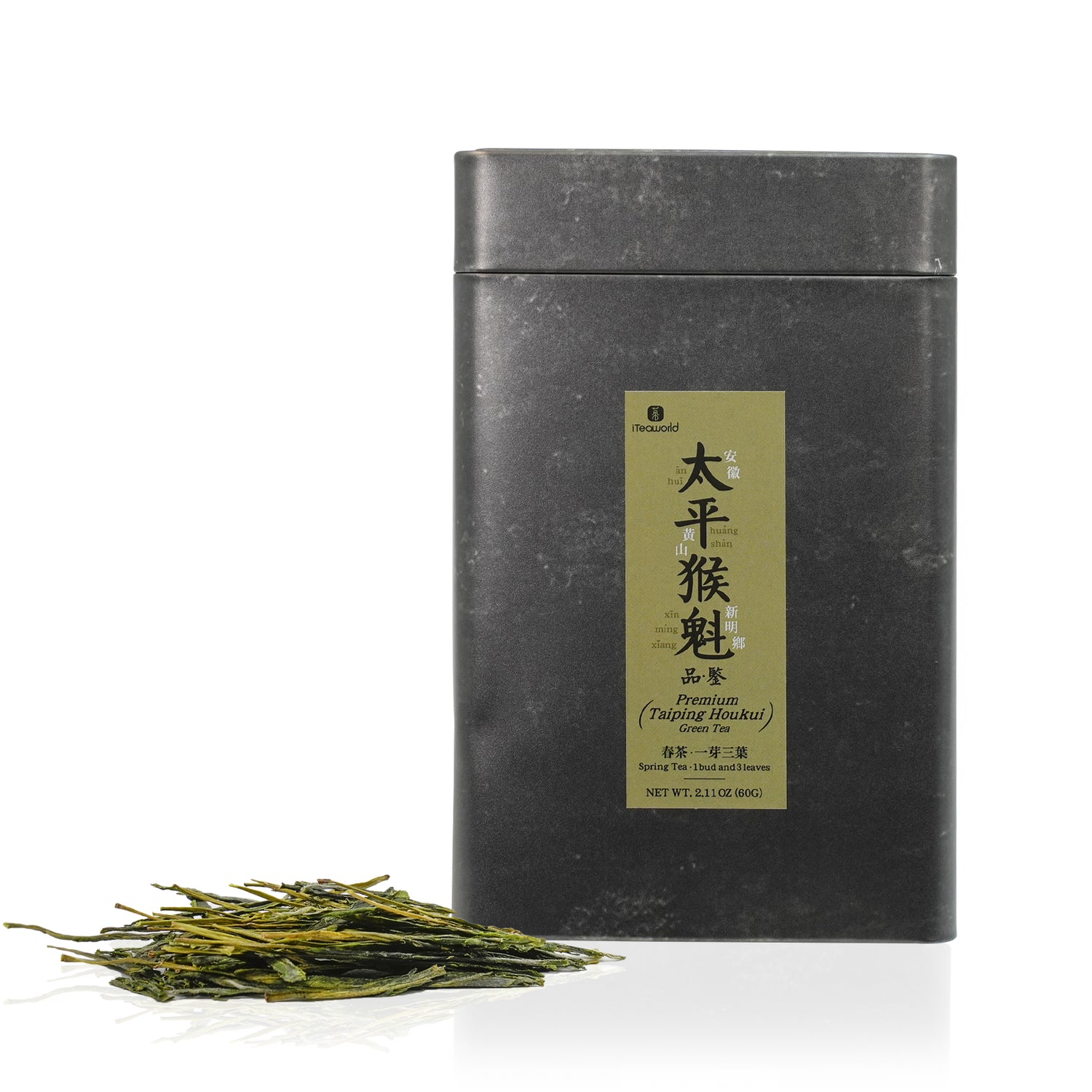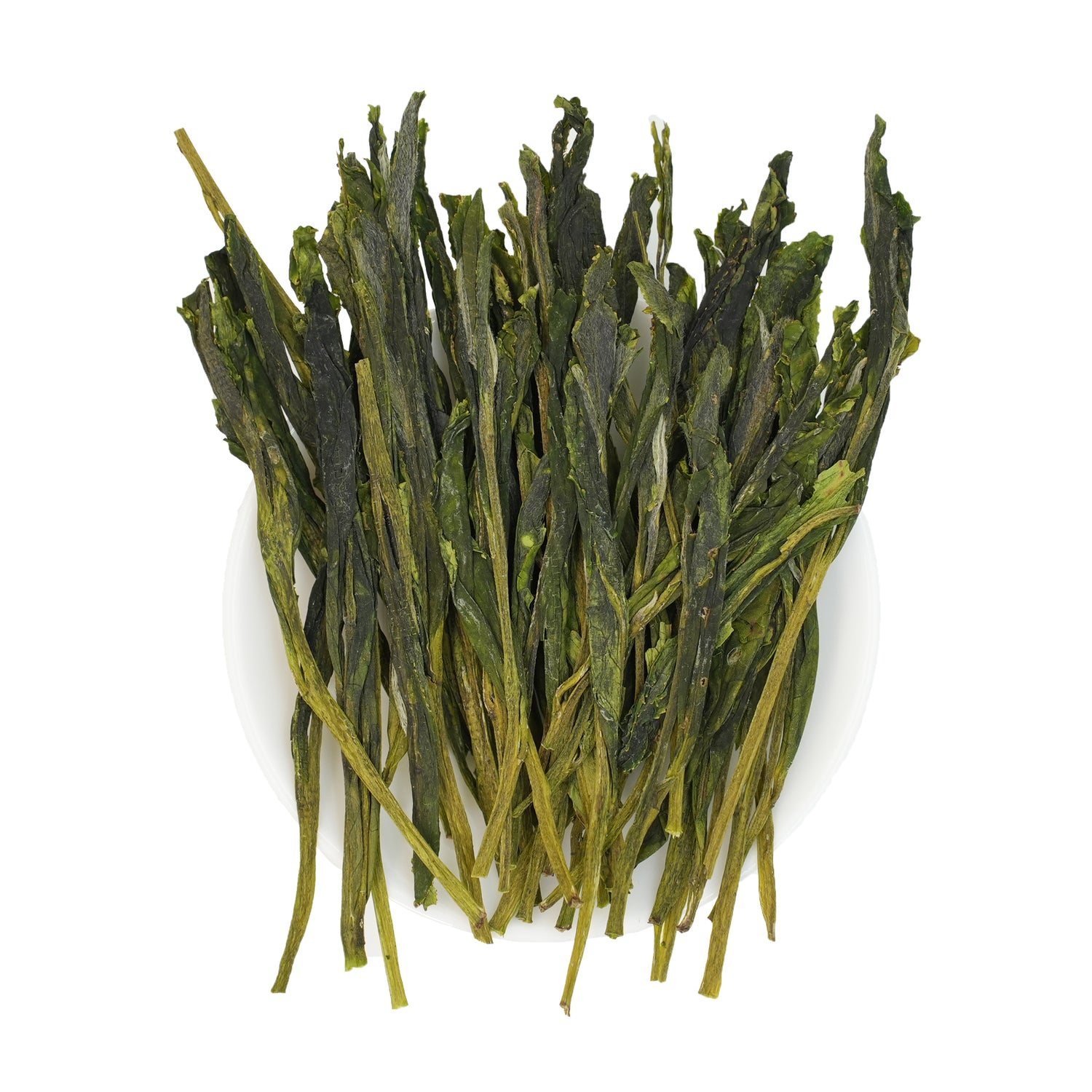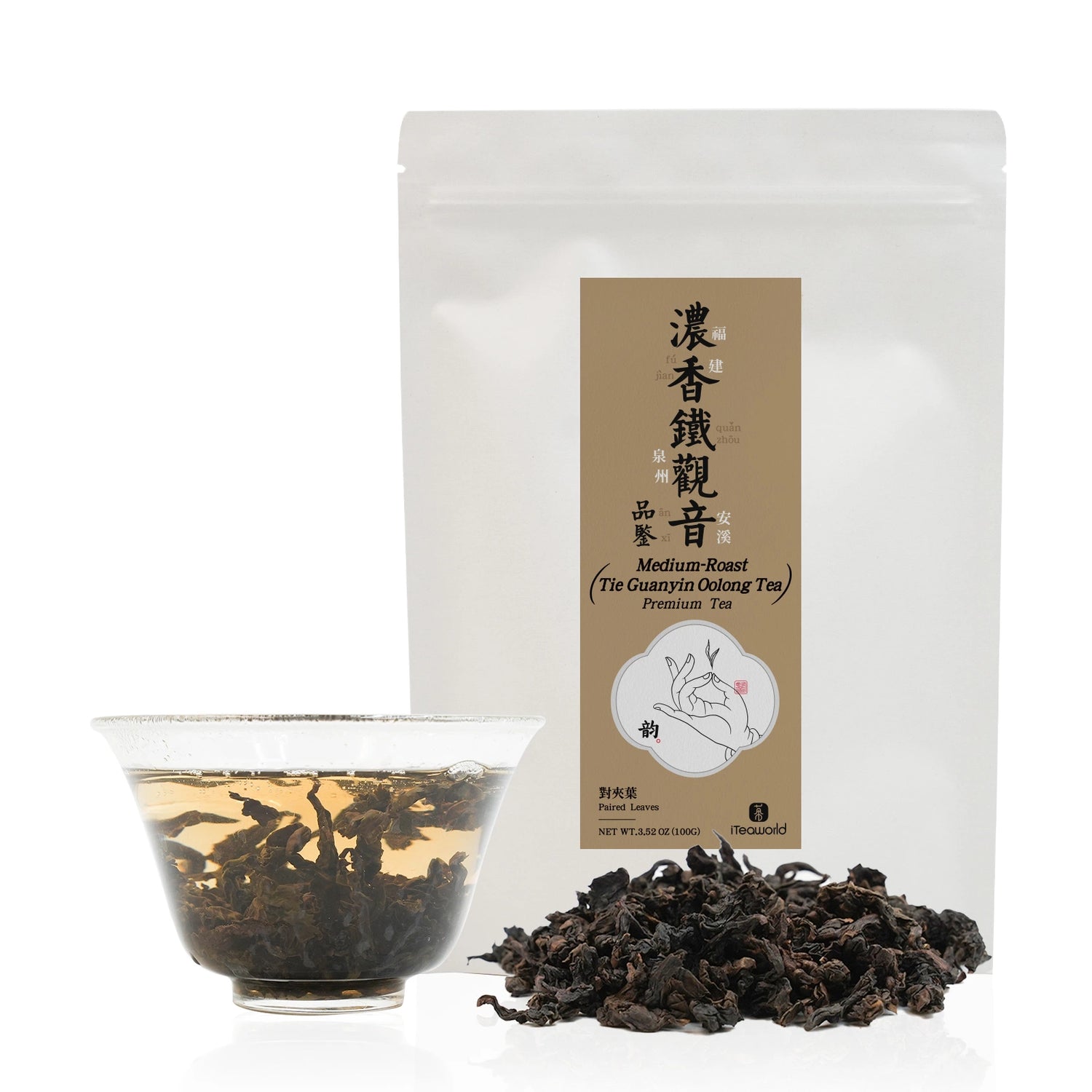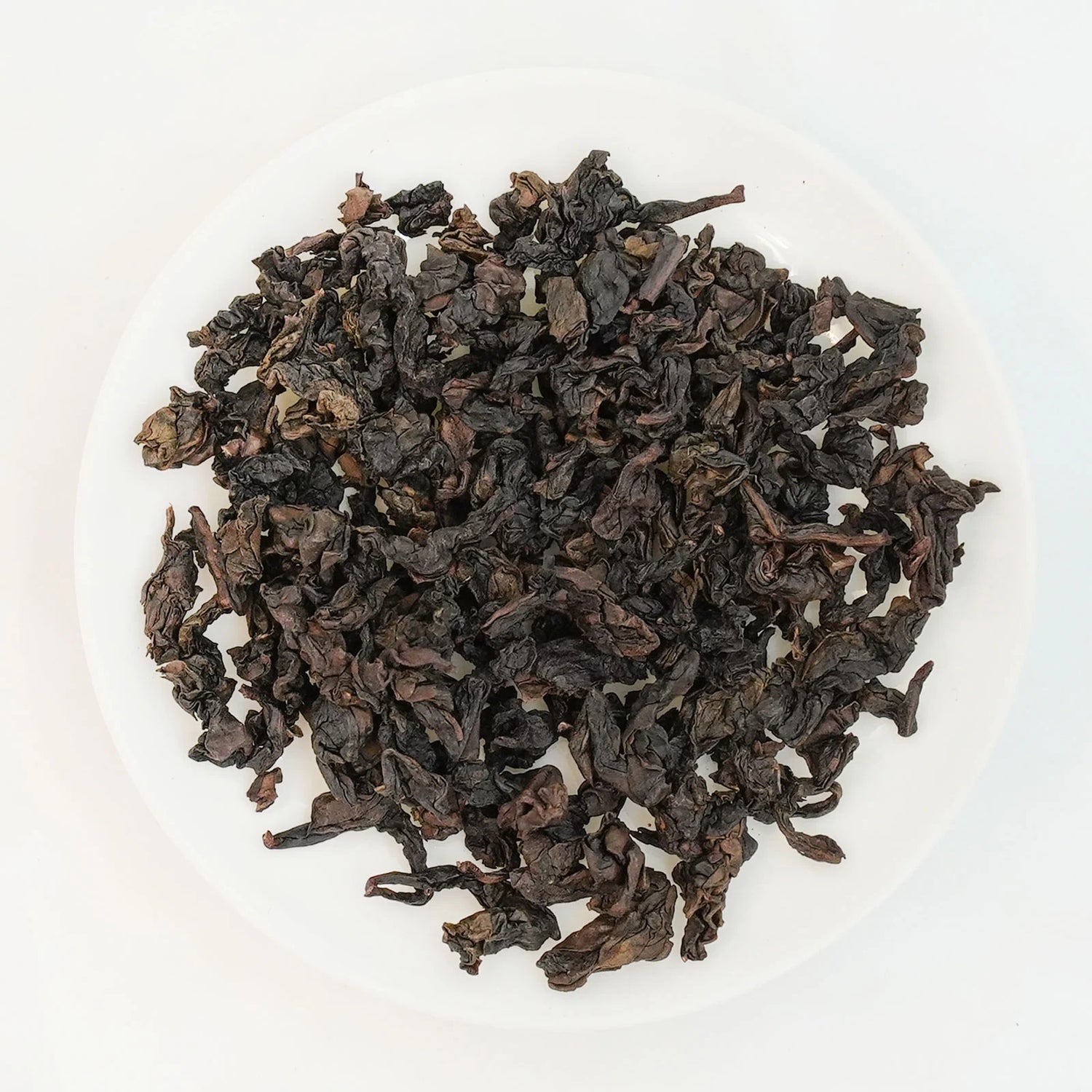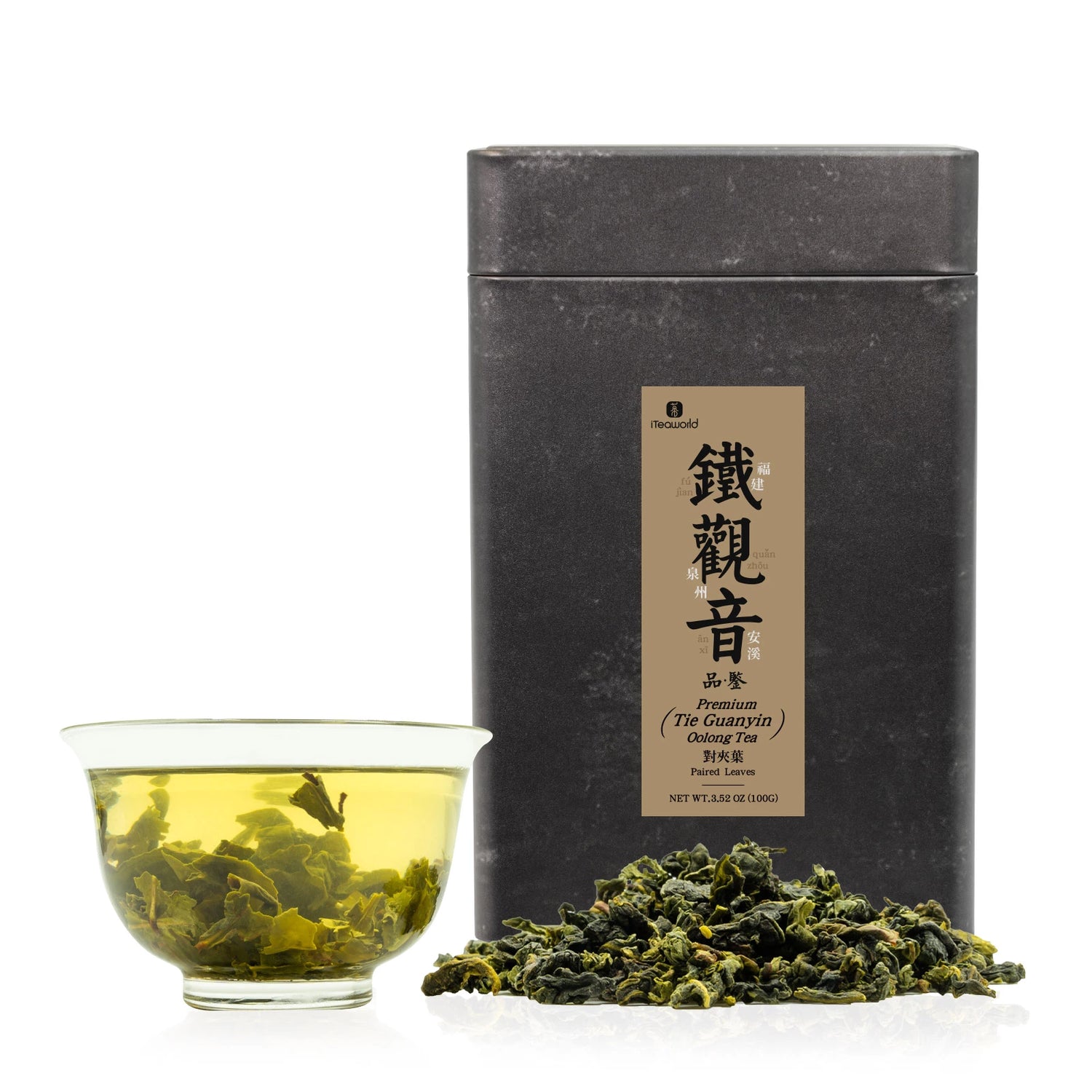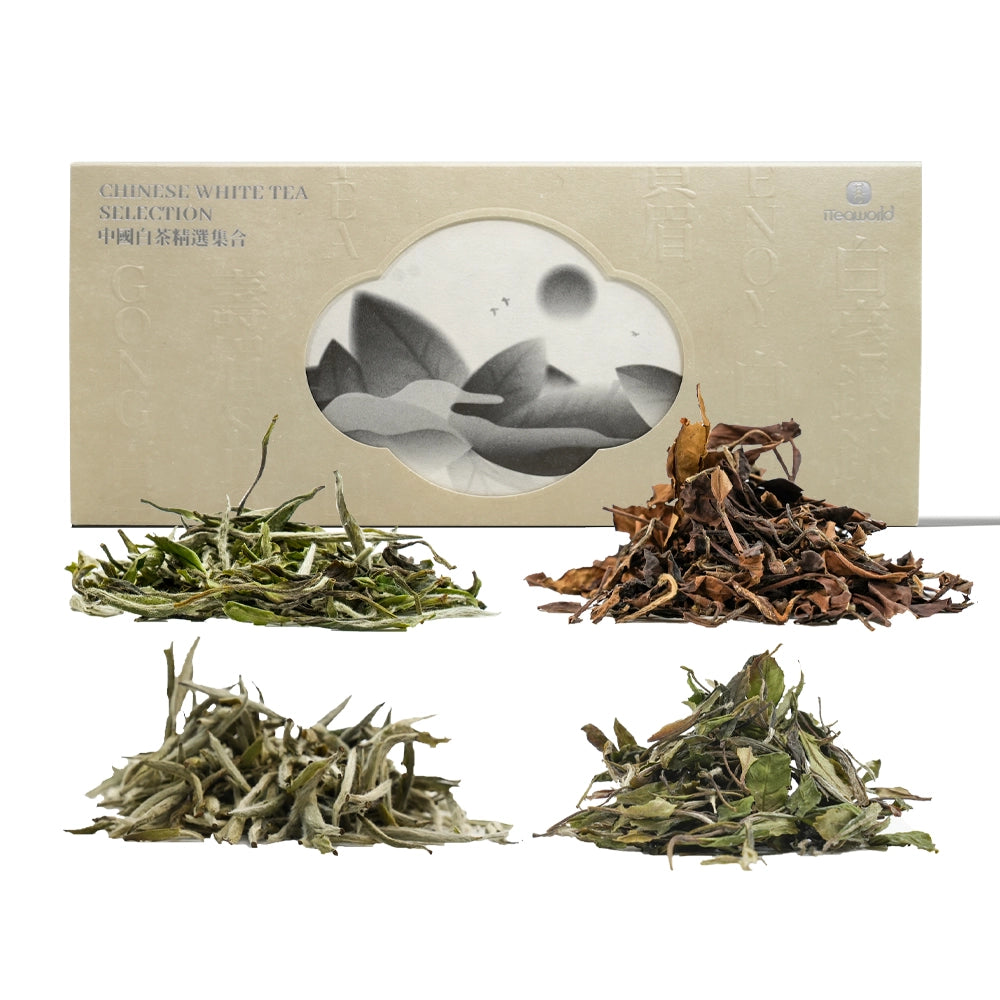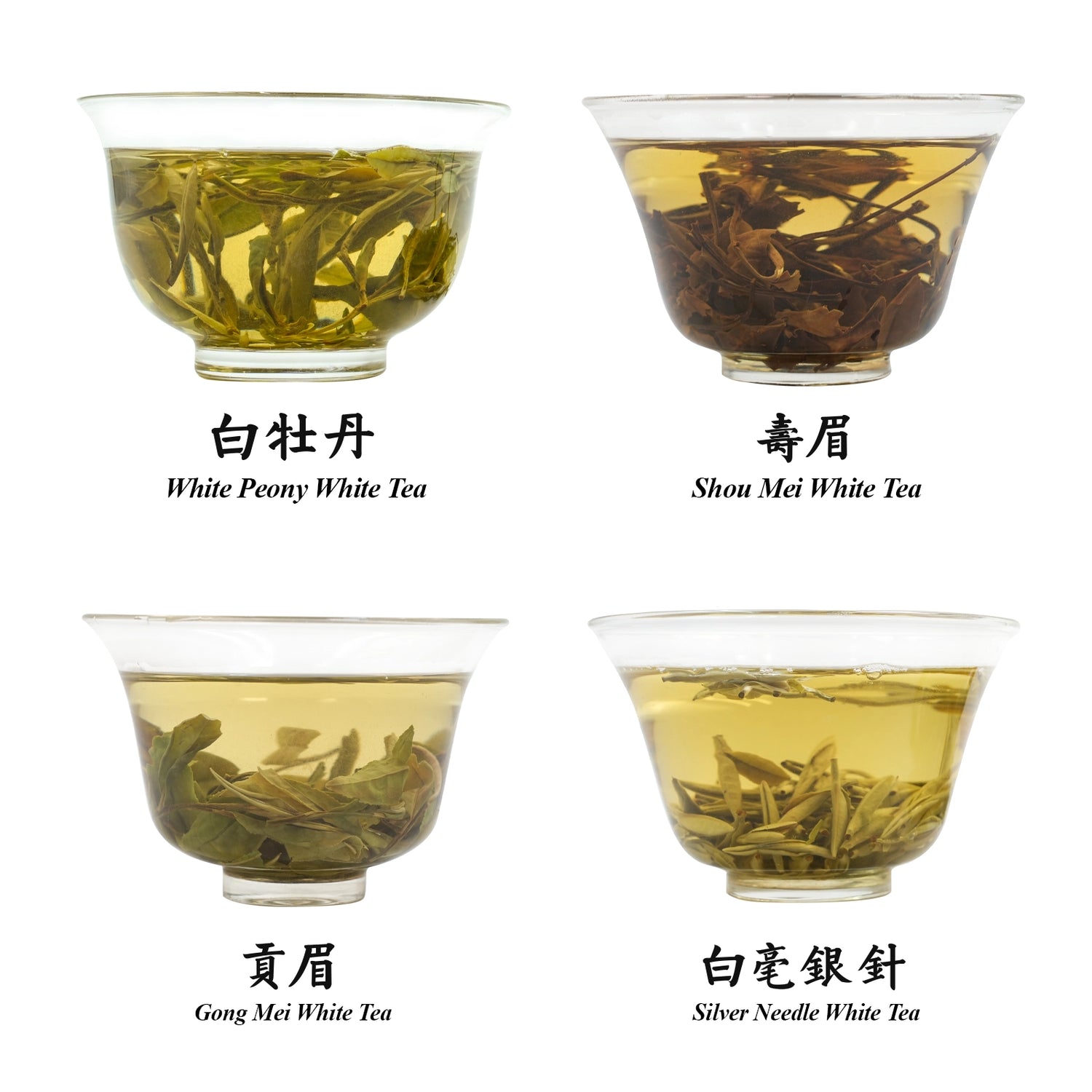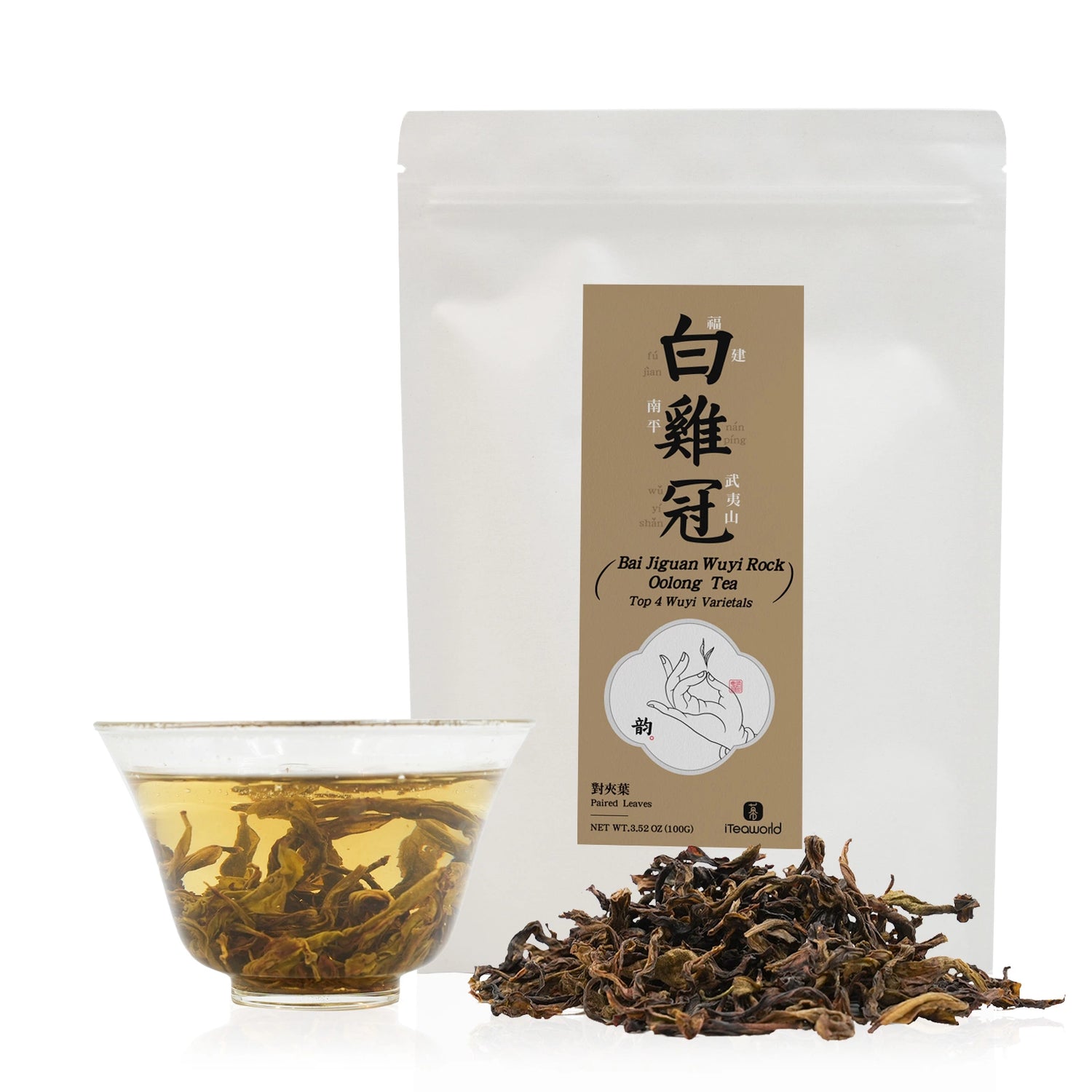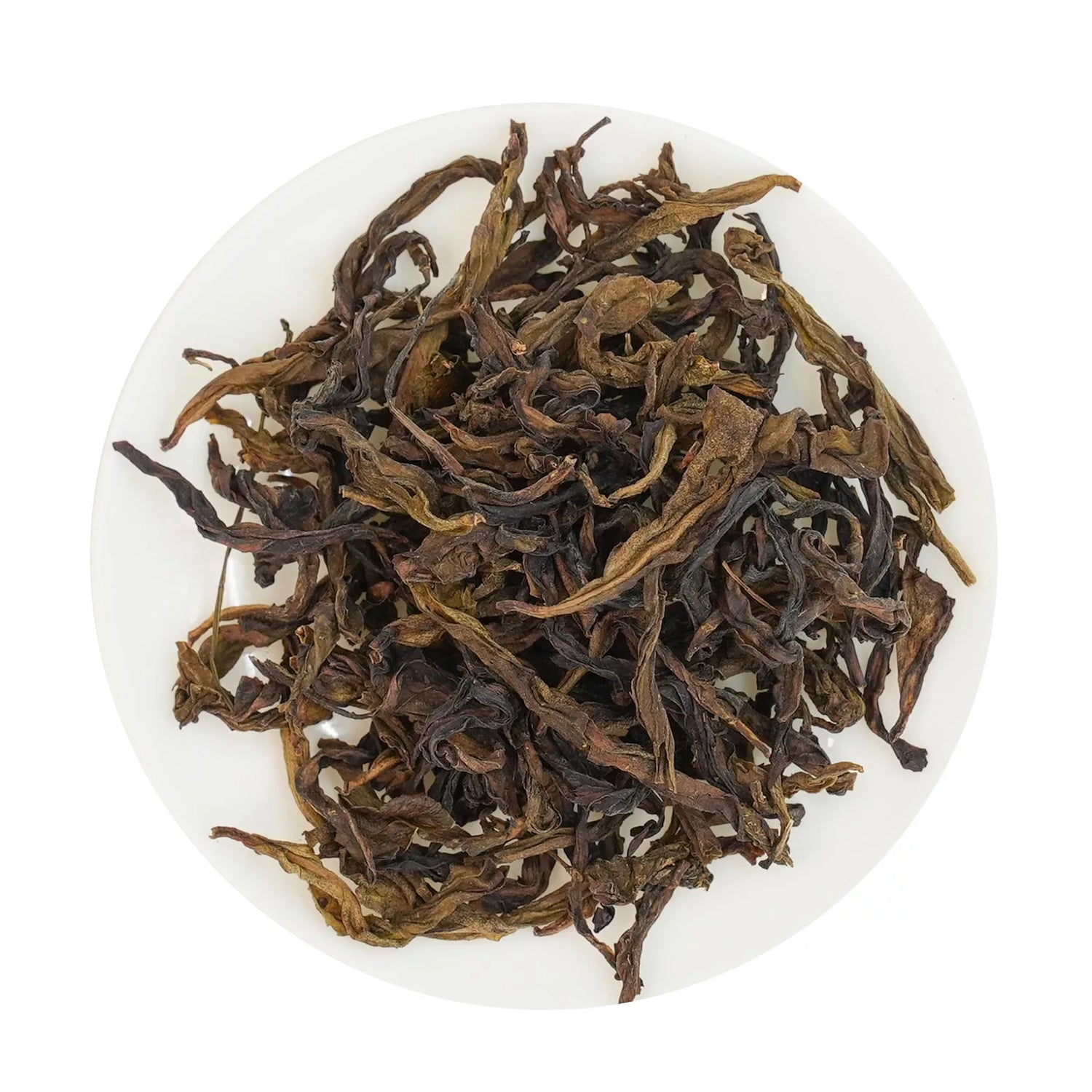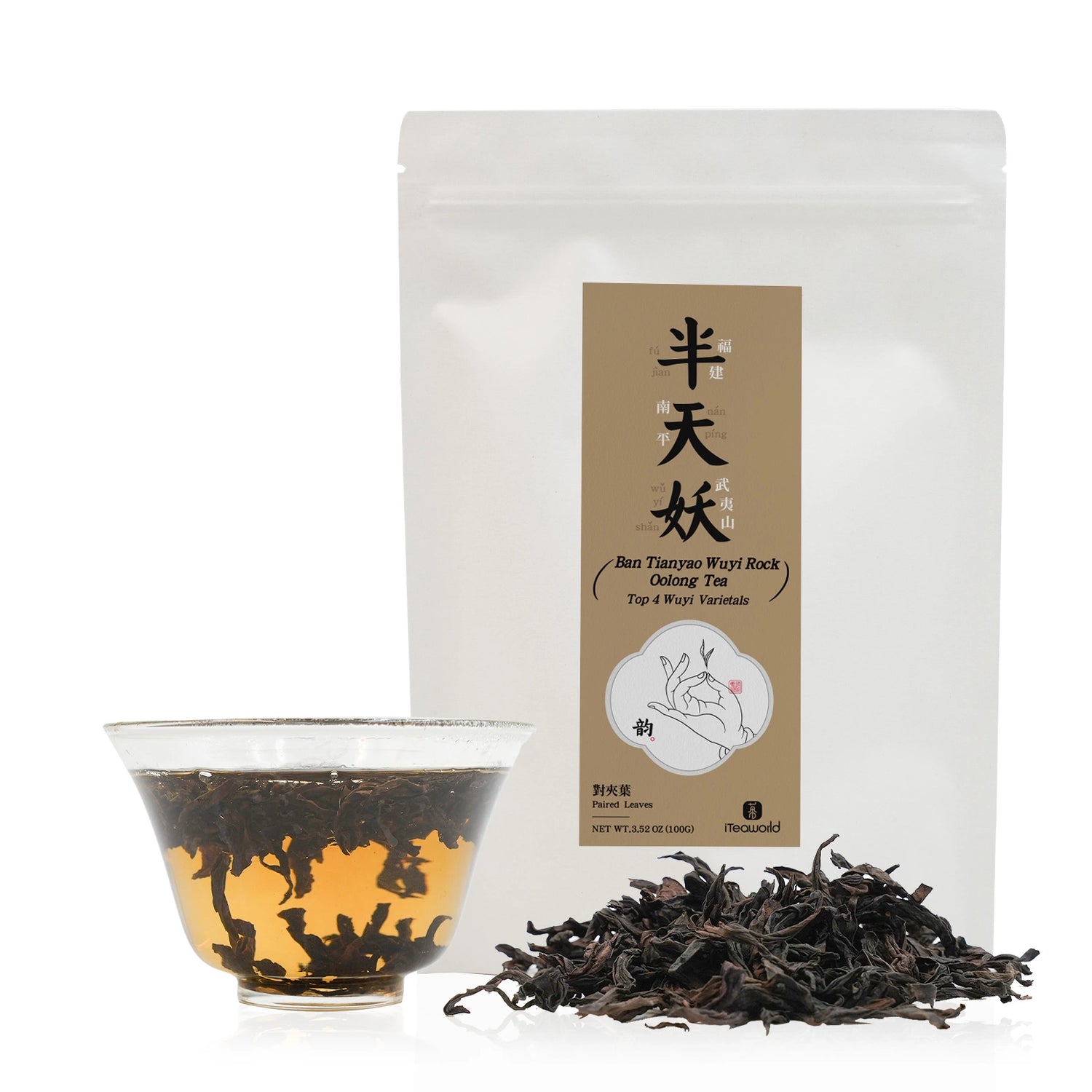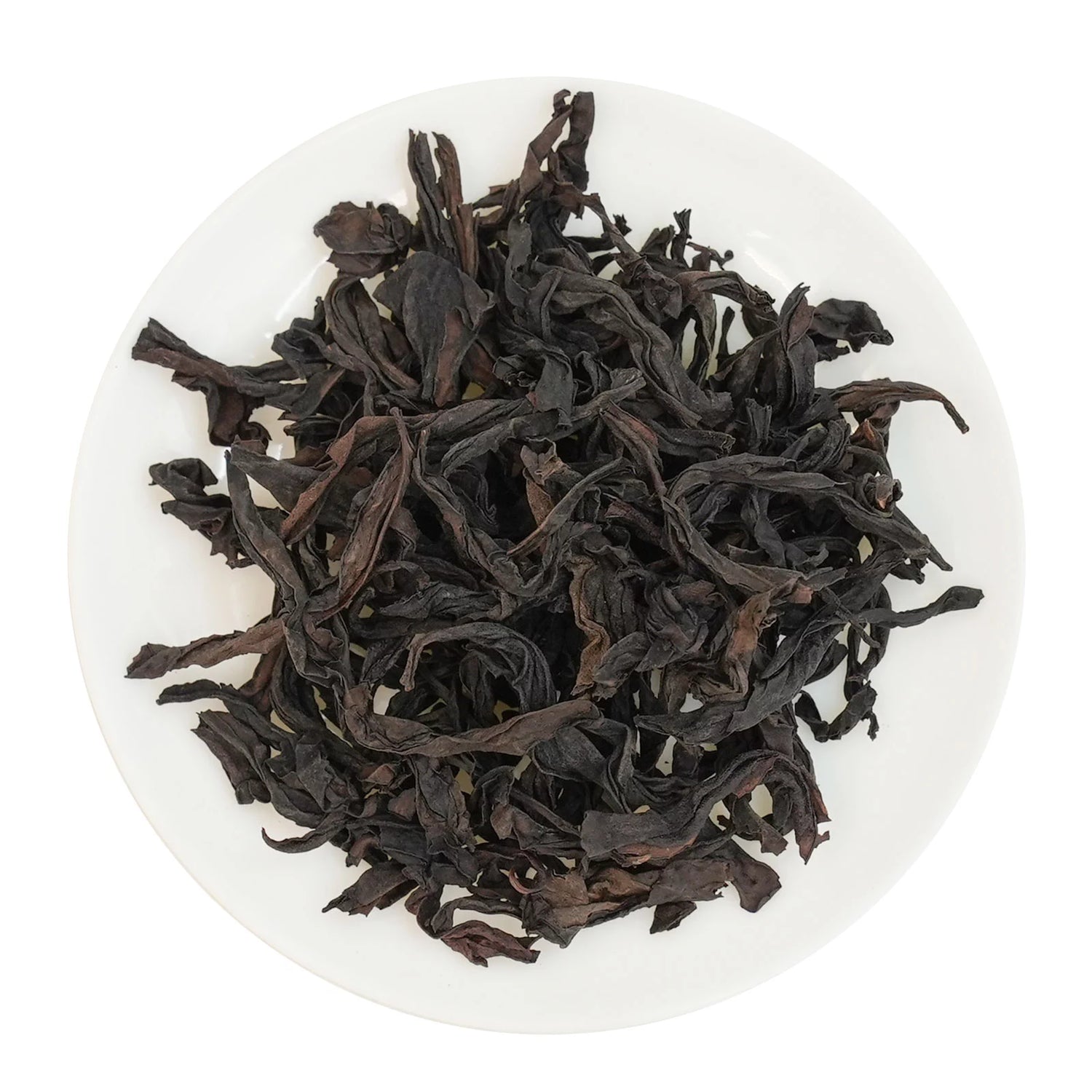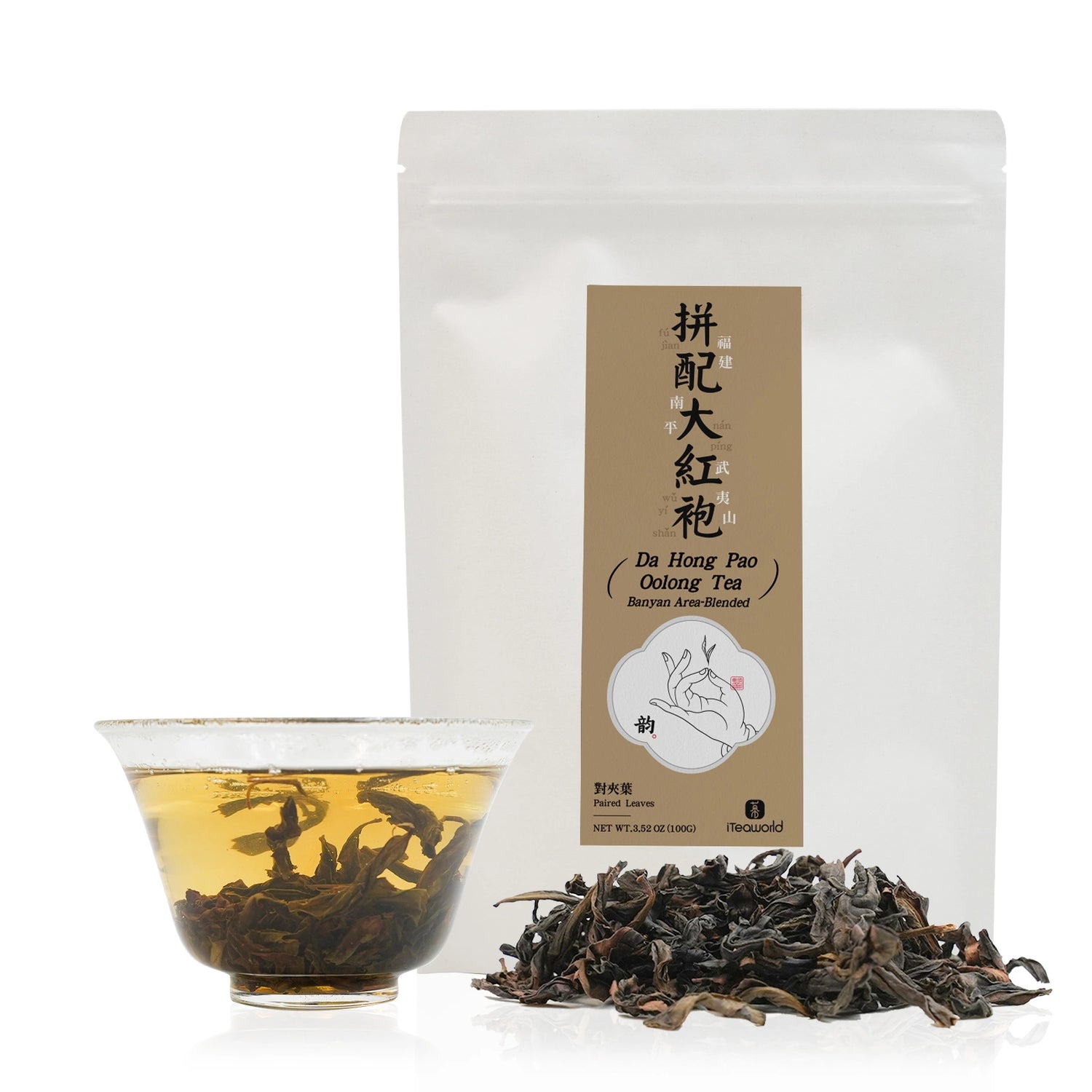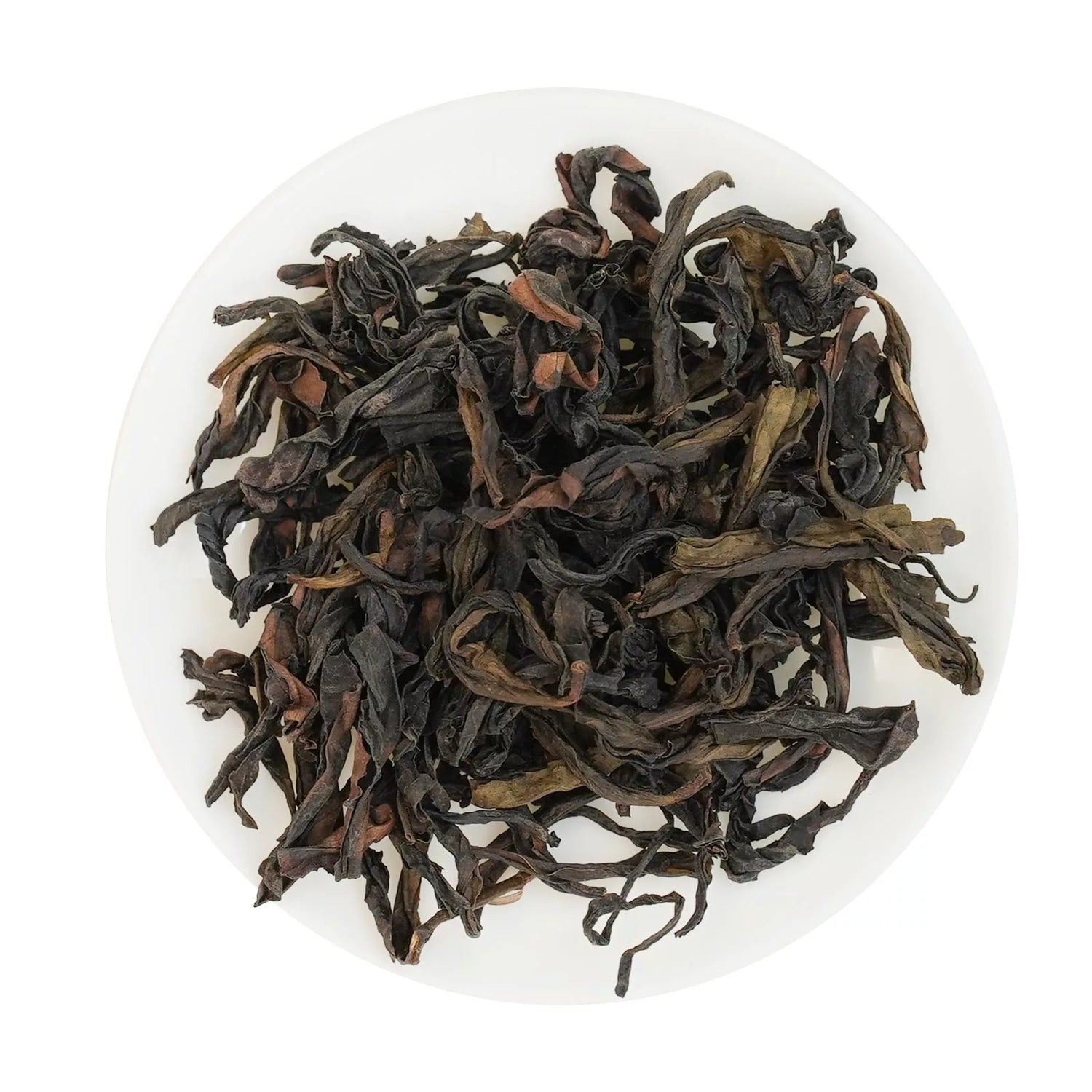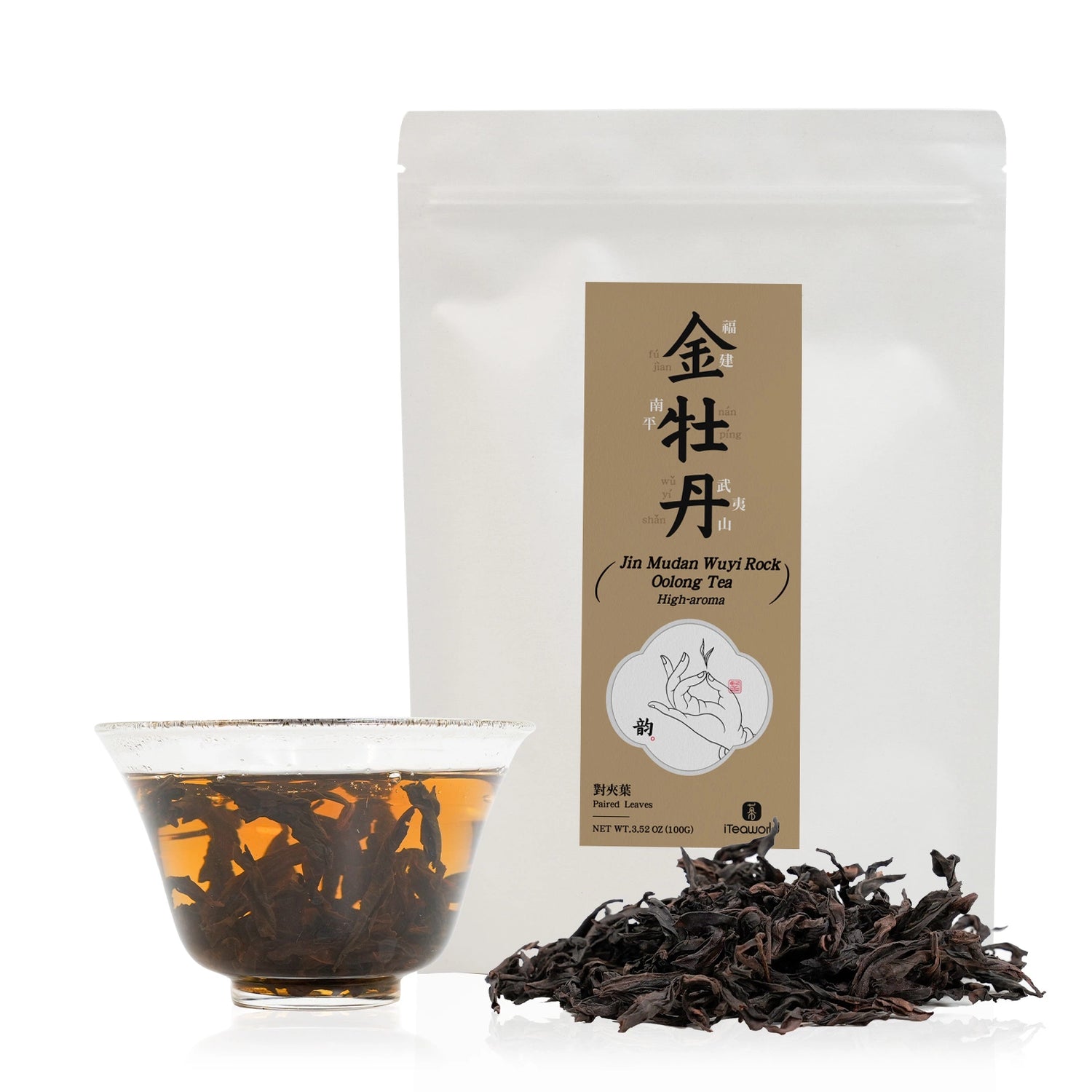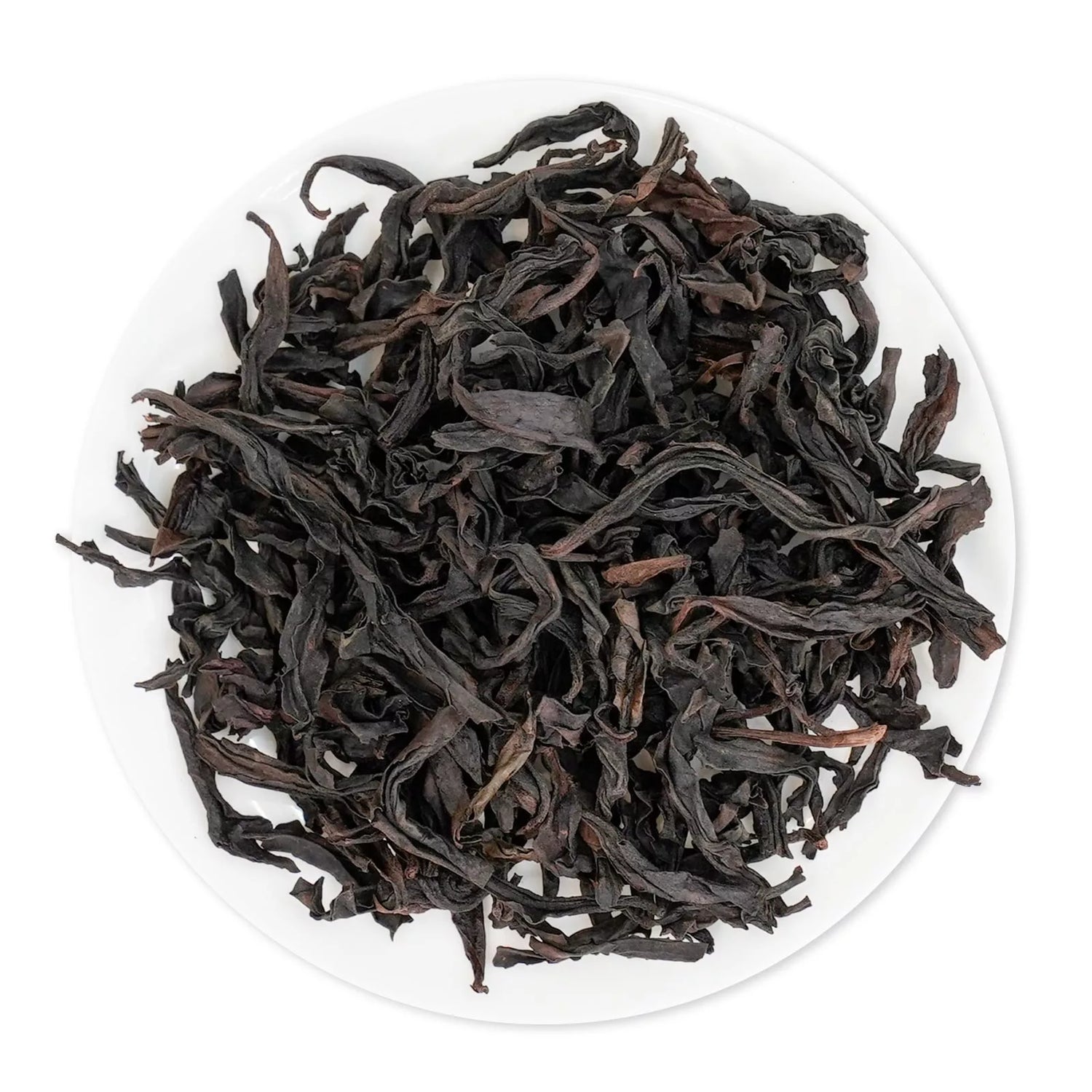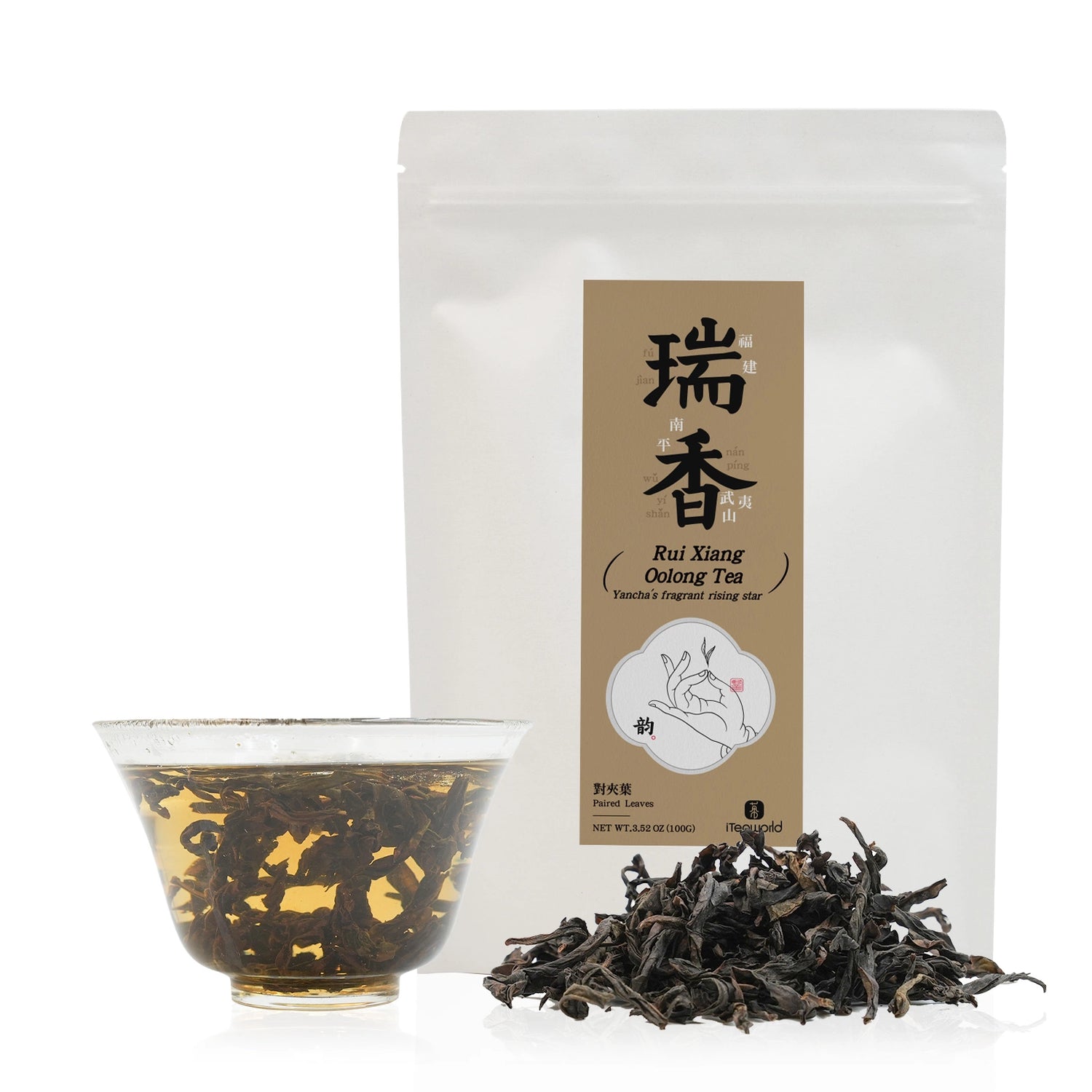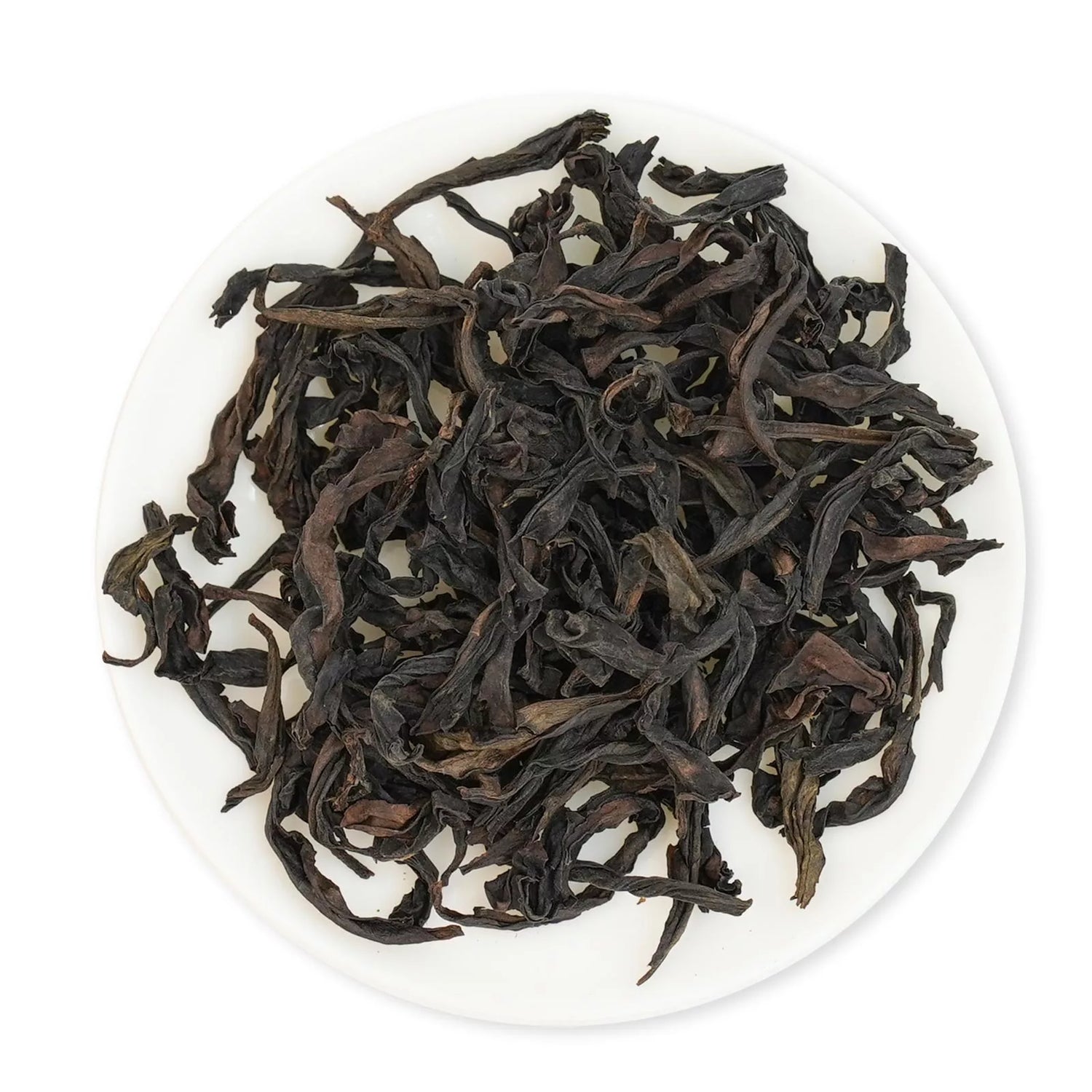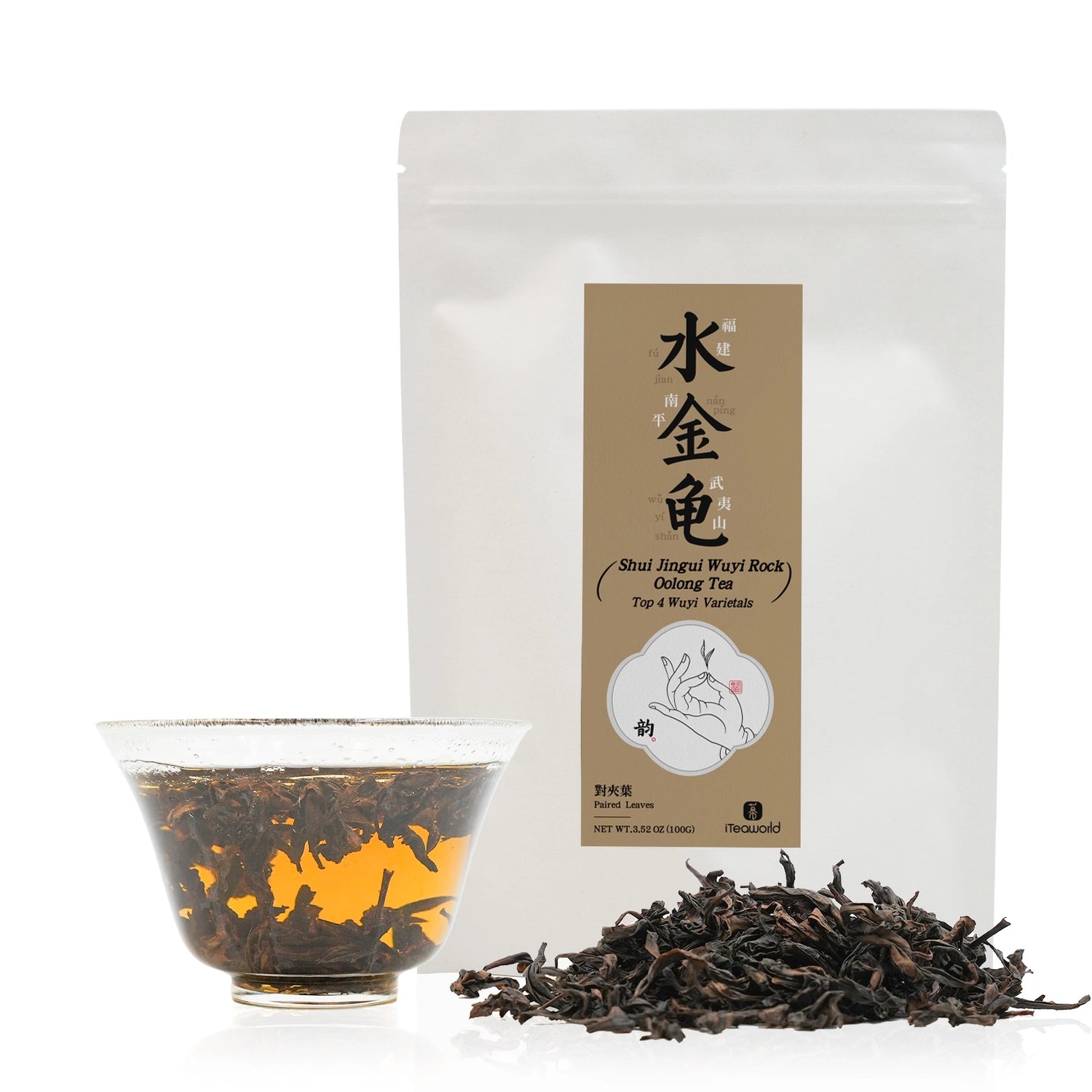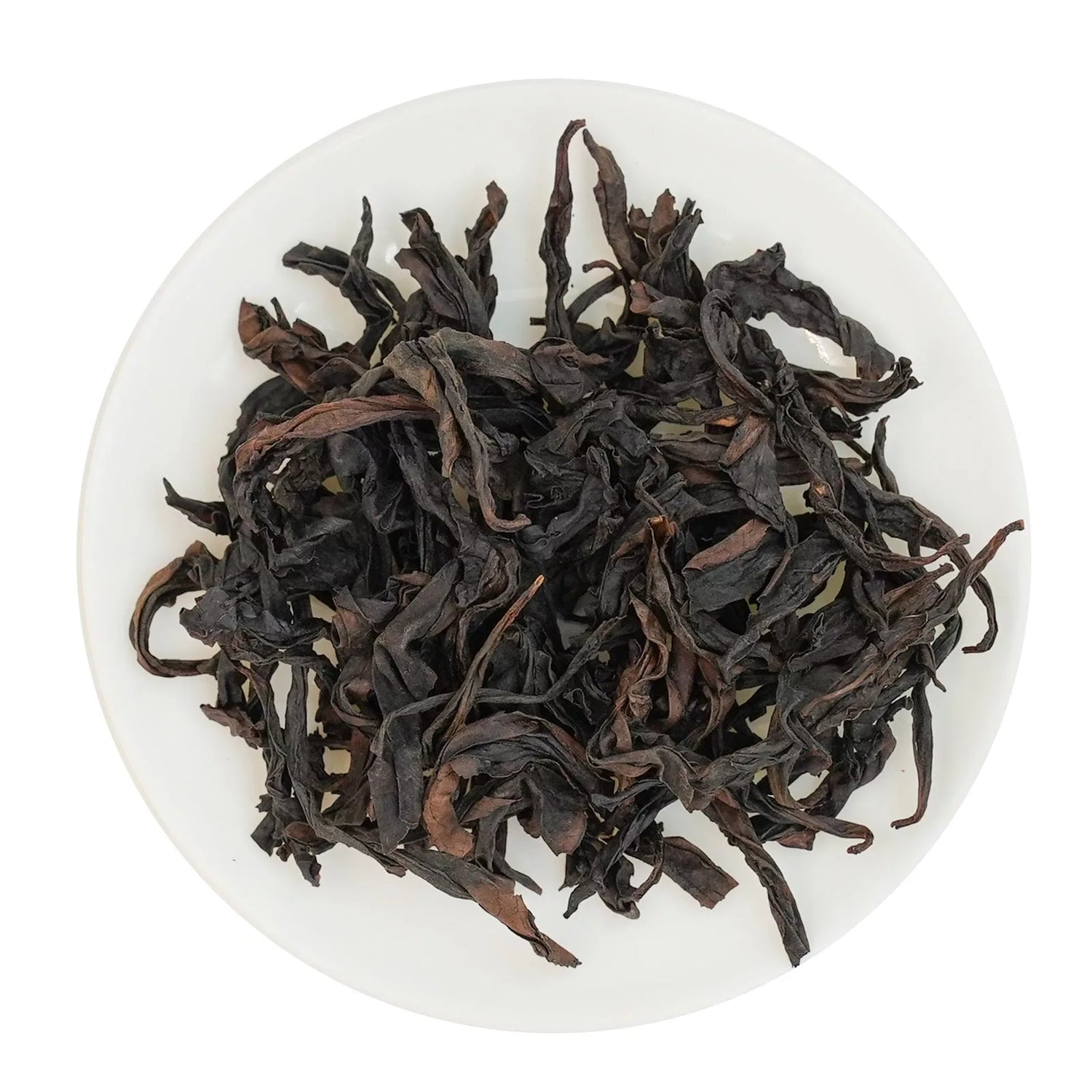Sort by:
177 products
177 products
Introduction:
This Jasmine Zhen Wang is meticulously selected from the spring harvest of 2023. Plucked from high-altitude tea gardens in Jinggu County, Yunnan Province, at elevations of approximately 1200 meters, the exceptional growing conditions impart a fresh and richly layered flavor to this jasmine tea. The plucking standard of primarily bud tips, combined with seven scenting processes, ensures a vibrant, long-lasting floral aroma, a refreshing and smooth taste, and a sweet, lingering aftertaste.
Reasons to Recommend:
- Scenting Process: High-quality green tea serves as the base, while jasmine flowers from Hengzhou, Guangxi, are used for scenting. The traditional scenting process is repeated seven times, resulting in a tea with a full, lively floral aroma and a layered complexity that gradually unfolds in the mouth with each sip.
- High-Mountain Tea Gardens: Since ancient times, high mountains shrouded in mist have produced premium teas. This tea thrives in such environments, where lush vegetation and organic-rich soil, combined with extreme daily temperature fluctuations, enhance the accumulation of flavorful compounds in the leaves.
- Whole Bud Material: The plump, straight bud tips are covered in abundant, visible white hairs, indicating their tenderness. These buds absorb the jasmine fragrance more effectively during scenting, resulting in a more intense, fresh aroma and a smoother taste. The tea retains its flavor and aroma even after multiple infusions.
Oxidation Level: None
Roasting Level: None
Processing Time: September 2024
Best Before Date: 18 months
Tea Variety: Yunnan Big Leaf
Dwarf Oolong, also known as Small Leaf Oolong or Soft Branch Oolong, originates from Dongfeng Town in Jian'ou City. It is the ancestral tea tree variety of the Beiyuan Tribute Tea, with a cultivation history tracing back to the Song Dynasty. During the Qing Dynasty, it was introduced to Taiwan and developed into the famous Qingxin Oolong and Dong Ding Oolong. Its unique flavor continues to be highly appreciated by local tea connoisseurs.
This tea comes from the original Dwarf Oolong plantations in Dongfeng Town. It offers a delicate, lingering aroma with distinctive notes of honey peach or osmanthus. The fragrance is long-lasting, the taste rich, mellow, and refreshing, with a clear golden liquor. Even after multiple infusions, both the aroma and color remain stable.
Origin:
Dongfeng Village, Dongfeng Town, Jian'ou City, Fujian Province, China
Elevation:
500–600 m
Soil Type:
Yellow Soil
Tea Variety:
Dwarf Oolong
Tea Master:
Ye Jiansheng
Harvest Season:
November 2024
Shelf Life:
36 months
Brewing Guidelines
Water Temp: 100°C (212°F)
Brewware: Gaiwan, Yixing Clay Teapot
Tea-to-Water Ratio: 5-7g per 100ml
1–3 infusions: 8-15 sec
Later infusions: Add 5–10 sec
Total brews: 8-10 times


Premium Lingtou Dancong (Honey Orchid) The Everyday Honey-Sweet Oolong 100g 2025
$24.99 USD
Unit price perPremium Lingtou Dancong (Honey Orchid) The Everyday Honey-Sweet Oolong 100g 2025
$24.99 USD
Unit price perLingtou Dancong | The Everyday Honey-Sweet Oolong
A smooth, affordable, and incredibly drinkable oolong with long-lasting honeyed sweetness—perfect for daily sipping and afternoon tea.
If you're looking for a "universal" tea that’s easy to love, pairs beautifully with desserts, and delivers consistent quality without breaking the bank—Lingtou Dancong is the one. Known for its mellow honey character and exceptional value, this tea could become the next “sweet icon” of Chinese tea, right after jasmine.
Tea Details
-
Cultivar: Bai Ye Dancong (White Leaf Dancong)
-
Harvest: Spring 2025
-
Origin: Lingtou Village, Fubin Town, Raoping County, Chaozhou, Guangdong
-
Elevation: 500–700m
-
Tree Age: Under 30 years
-
Roast: Traditional charcoal roast
Why You Need to Try It
-
Love sweet tea? Its thick honey note rivals most oolongs—and even some black teas.
-
Seeking value? This is one of the most affordable yet flavorful Dancong oolongs.
-
Exploring the diversity of Guangdong oolong? Lingtou is a classic, but outside the better-known Phoenix Dancong system.
Origin & Story: Sweetness Born in the Mountains
Lingtou Dancong, also called Bai Ye Dancong (White Leaf Dancong), comes from Lingtou Village in Raoping County, Chaozhou, Guangdong. First cultivated in 1961, it was selected from wild Phoenix Shui Xian trees and now accounts for over 50% of tea garden area in Guangdong.
-
Cultivar: Small-tree, large-leaf type
-
Elevation: 500–700m
-
Soil: Mountain red clay with good drainage
-
Climate: Warm, misty, ideal for floral and honey aroma development
Flavor Profile: Rich Honey, Soft Floral, Easy to Love
Lingtou Dancong offers a bright, golden infusion with high floral aroma and a distinctive “mi yun” (honey rhyme)—a signature note prized by Chaozhou tea drinkers. It’s:
-
Sweet and smooth, never bitter
-
Medium-thick in body, with a lingering aftertaste
-
Great for pairing with pastries, fruit, or just a peaceful afternoon
Flavor Comparison:
-
Lingtou Mi Lan Xiang (Honey Orchid): Emphasizes honey, subtle florals
-
Phoenix Mi Lan Xiang: Emphasizes orchid, with lighter honey undertone
“A honey-sweet tea you can drink every day and never get tired of.”
Brewing Recommendations
Gongfu Style:
-
5g per 100ml gaiwan
-
95-100°C water
-
Quick rinse, then infuse 6–8+ times starting from 10 seconds
Western Brewing:
-
2g per 200ml
-
Steep at 95–100°C for 1–3 minutes
-
Can re-steep 2–3 times
-
Tasting Grade Longjing Tea Product Introduction and Reasons for Recommendation:
This Tasting Grade Longjing Tea is semi-handcrafted by Master Pan, who has 30 years of tea-making experience, and is carefully selected from the freshest pre-rain spring tea of 2024. As a traditional group variety Longjing, this tea is picked from high-altitude tea gardens in Lishui, Zhejiang, at an altitude of over 900 meters, where the superior climate conditions give the tea a more refreshing taste and rich layers of flavor. The tea is picked with buds and one to two leaves, ensuring its fresh and sweet taste, accompanied by a light and elegant fragrance.
Reasons for Recommendation:
Exquisite Craftsmanship: Master Pan has 30 years of experience in making Longjing tea, combining semi-manual techniques to ensure that each batch of tea can showcase the classic taste and unique flavor of Longjing tea.
High-Altitude Tea Gardens: Compared to other Longjing teas, this tea comes from high-altitude tea gardens in Lishui, where the superior climate conditions make the tea richer in substance, sweeter in taste, and more refreshing in aroma.
Pre-Rain Harvest: Pre-rain Longjing has tender leaves and is rich in substances, with a clear and sweet tea soup, accompanied by an elegant floral fragrance, making it a top choice among high-quality green teas.
Group Variety Tea Trees: Group variety tea trees have deep root systems, resulting in a richer taste and more lasting aroma. Compared to the Longjing 43 variety, Longjing tea made from group variety tea trees is more resistant to brewing, and the tea soup has a richer taste.
Suitable for:
Consumers who pursue high-quality green tea and pay attention to cost-effectiveness.
People who like the fresh and sweet taste of Longjing and want to experience the authentic flavor of the group variety Longjing.
Not Suitable for:
Tea lovers who prefer a richer and fuller taste may find this Longjing too subtle.
If you are only looking for the core production area West Lake Longjing, this Lishui Longjing may not be within your consideration.
Whether you are looking to experience high-quality Longjing or to find an affordable and authentic green tea, this Tasting Grade Longjing Tea will be an ideal choice.
Lu'an Guapian is a historic Chinese tea with a royal past, once a tribute tea reserved exclusively for the imperial family. Today, this precious green tea still maintains its unique traditional craftsmanship and flavor profile. Our connoisseur-grade Lu'an Guapian is handcrafted by a tea master with 30 years of experience, using leaves from the small-leaf variety tea plants in Lu'an, Anhui, grown at an altitude of 600 meters. Harvested in the spring, when the leaves are most tender, this tea boasts a rich aroma and a refreshing flavor, making it the optimal picking time of the year. Lu'an Guapian is selectively picked for the second leaf from the bud and two leaves, discarding the stem and the tender bud, retaining the essence of the tea leaf to ensure the purity and delicate freshness of the tea soup.
Why choose our connoisseur-grade spring Lu'an Guapian?
Top-tier tender leaves picked in spring: Harvested in the spring, these leaves are at their peak freshness, offering a more vibrant flavor, rich aroma, and a longer-lasting aftertaste with a higher degree of freshness in the tea soup.
Stem-free purity: All stems are removed, leaving only the carefully selected leaves for a purer taste, free from woody or astringent flavors, resulting in a refreshing and naturally sweet tea soup.
The freshness and aftertaste of high-mountain tea: Grown at an altitude of 600 meters, the slow growth cycle imparts a more refreshing taste and enduring aftertaste, with a rich mouthfeel and prominent chestnut aroma.
Handcrafted, preserving traditional skills: Meticulously hand-fried by a tea master with 30 years of experience, this tea retains traditional production techniques, ensuring the high quality of each leaf.
Authentic origin, unique terroir: Sourced from the core production area in Jinzhai County, Lu'an, Anhui, the small-leaf variety tea plants grow in traditional agricultural tea gardens with a history dating back to the 1960s and 1970s. The natural growth of the tea plants ensures the natural flavor of the leaves.
Reasons to recommend:
This spring Lu'an Guapian is ideal for consumers who love tender and refreshing flavors. Its spring harvest, pure tea soup, refreshing taste, and lasting aftertaste are particularly suitable for consumers who pursue a high-quality tea experience. If you're looking for a green tea with a refreshing chestnut aroma and natural sweetness, this tea will surely satisfy you.
Not suitable for:
If you prefer strong, bitter flavors or are not accustomed to the light taste of green tea, this tea may not meet your taste preferences. Additionally, as it is a high-end connoisseur-grade spring green tea, it is slightly more expensive than regular green tea, so budget-conscious consumers might consider more economical options.
Meizhan (Plum Fragrance Oolong)
Meizhan is a traditional oolong variety native to Anxi, first discovered in the early 19th century. It’s named for its signature plum blossom aroma and complex floral-fruity character. The leaves are thick and crisp, requiring gentle oxidation and careful handling during processing to preserve its elegant fragrance.
Our Meizhan comes from Chishui village in Xiping, Anxi—grown at 900 meters in a cool, misty climate ideal for this cultivar. The tea is traditionally medium-roasted, offering a perfect balance of fire and fragrance: notes of plum, orchid, and a touch of woodiness, with a soft, full-bodied finish.
A great choice for tea lovers who enjoy both floral and fruity complexity with a warming roasted undertone.
-
Origin: Chishui Village, Xiping Town, Anxi County, Fujian, China
-
Elevation: 900 meters
-
Tea Maker: Chen Jiangzhi
-
Harvest: 2025
-
Shelf Life: 36 months
-
Cultivar: Meizhan
-
Tree Age: 50 years
Phoenix Lang Cai Oolong | The Hidden Hermit of Guangdong Teas
A bold and rare oolong born in the misty peaks of Phoenix Mountain, Guangdong.
Phoenix Lang Cai (浪菜), literally meaning “tossed greens,” is a traditional and lesser-known style of Chaozhou oolong tea. Crafted at altitudes above 600 meters from heirloom Phoenix Shui Xian tea trees, this tea bridges the flavor spectrum between high-fragrance Dancong and lighter Phoenix Shui Xian.
Tasting Notes
Expect an aromatic profile built on woody base notes, layered with wild honey, moss, and a distinct mineral “rock rhyme” (岩韵). The liquor is bright amber-orange. First sips are sweet and powerful, followed by a long, smooth aftertaste with a hint of wildflower nectar. This is not a delicate tea—it is bold, rustic, and grounding, with a raw mountain energy.
Origin: Phoenix Mountain, Chaozhou, Guangdong, China
Cultivar: Phoenix Shui Xian group cultivar
Elevation: 600–800m
Crafting: Hand-tossed “Lang Qing” + medium charcoal roast
Storage: Best within 36 months in cool, dry conditions
What Makes Lang Cai Special?
In Chaozhou tea-making, “Lang Cai” refers to the traditional process of “Lang Qing”—gently tossing the tea leaves during oxidation to stimulate natural fermentation. This labor-intensive process lasts 8–12 hours and is done entirely by hand, often at night. Lang Cai teas sit between:
-
Dancong (highly aromatic, single-bush teas)
-
Phoenix Shui Xian (mild, lightly oxidized teas)
Lang Cai retains traditional craft elements—nighttime processing, hand-tossing, and charcoal roasting—all of which deepen its flavor complexity.
Why You’ll Love This Tea
-
If you enjoy teas with character – Lang Cai offers an earthy, grounding experience unlike the floral lightness of other oolongs.
-
If you're exploring the Guangdong oolong spectrum – This tea is a must-try, offering a “middle ground” between delicate and robust.
-
If you appreciate craft and terroir – Lang Cai reflects the minerals, mists, and time-honored methods of Phoenix Mountain more directly than any other style.
“Dancong is for aroma, Lang Cai is for structure, Shui Xian is for clarity.” – Chaozhou tea saying
Brewing Recommendations
Traditional Gongfu Style (Recommended):
-
Teaware: Gaiwan or small teapot (100–150ml)
-
Tea Amount: 5g
-
Water Temperature: 95–100°C (203–212°F)
-
Rinse: Quick rinse to awaken the leaves
-
Infusions: 6–8+ steeps, starting at 10 seconds
This method will bring out the layered aroma and long-lasting finish.
Western-style Brewing:
-
Teapot or infuser mug: 2g per 200ml
-
Temperature: 95°C / 203°F
-
Steep Time: 1-3 minutes
-
Suitable for 2–3 infusions
Who Is It For?
-
Intermediate to advanced tea drinkers looking to deepen their understanding of Chinese oolongs
-
Dancong lovers who want something more grounded and robust
-
Wuyi rock tea fans seeking a Guangdong counterpart with similar mineral complexity
-
Explorers of terroir and traditional craft
-
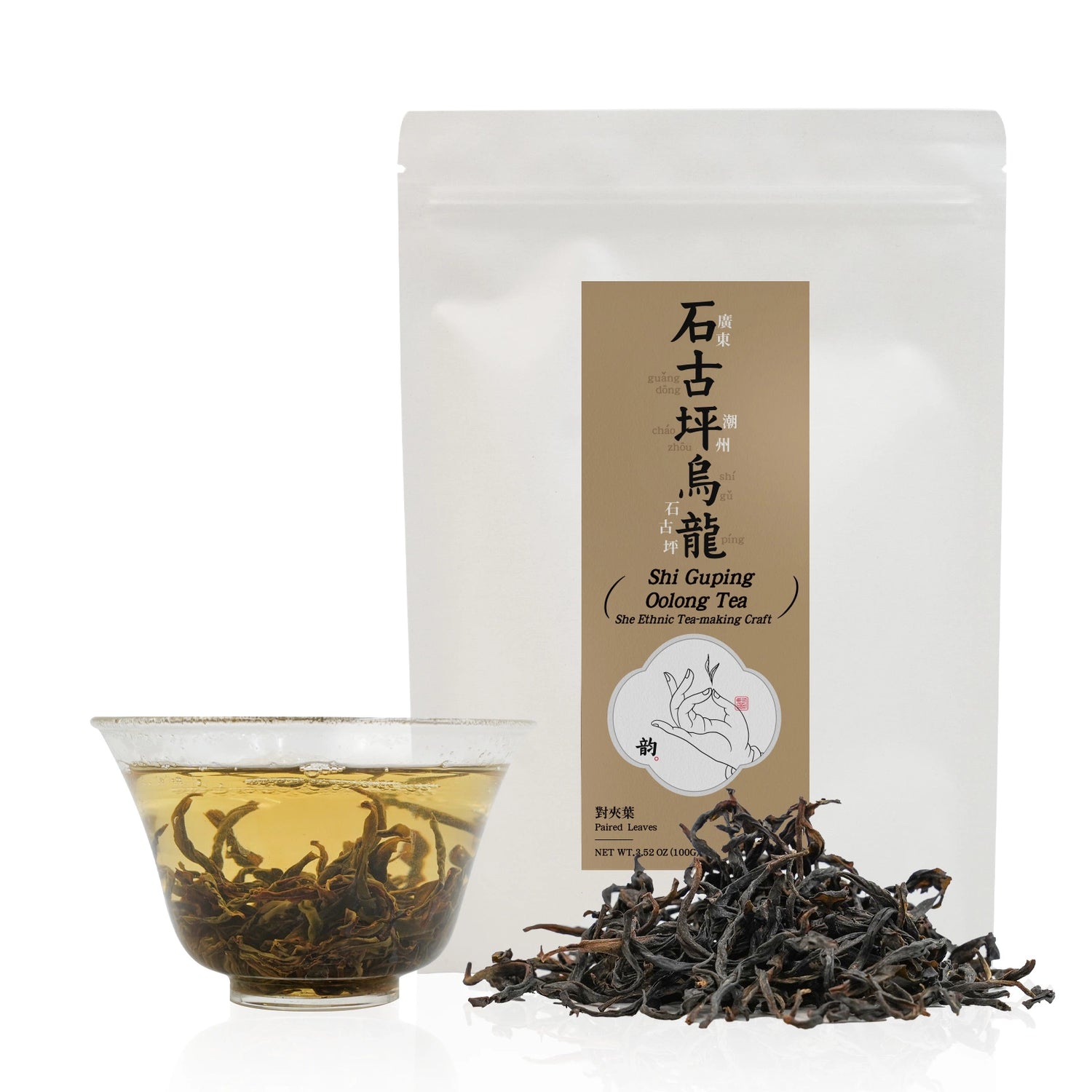

Premium Shiguping Oolong – Wild Phoenix Tea with Aged Pu’er Notes 50g 2025
$49.99 USD
Unit price perPremium Shiguping Oolong – Wild Phoenix Tea with Aged Pu’er Notes 50g 2025
$49.99 USD
Unit price perShiguping Oolong | The Wild Soul of Hakka Craft
A Rare Indigenous Cultivar with Ethnic Roots
Shiguping oolong is made from a local, indigenous tea cultivar traditionally cultivated by the She people, a minority ethnic group native to this part of Guangdong. Unlike the widely used Phoenix Shui Xian cultivar, this tea comes from a separate genetic lineage, maintained for generations in Shiguping Village.
The tea plants here are broadleaf shrubs, not arbor trees, and have adapted to volcanic soils and mountain mists. Their leaves are thicker and more polyphenol-rich than Phoenix cultivars, giving the tea a wilder, more mineral-driven taste—distinct from the fragrant and delicate Dancong varieties grown elsewhere in Fenghuang.
Flavor Note
A rare oolong with a mellow, grounding taste—low in aroma but high in sweetness and complexity. Though freshly made, it already shows a flavor style similar to a lightly aged raw pu-erh (around 2–3 years): soft, gently fruity. Unlike most Guangdong oolongs, this tea does not focus on floral fragrance, but offers a smooth, deep sweetness and strong aging potential.
Origin: Shiguping Village, Fenghuang Town, Chaozhou, Guangdong, China
Cultivar: Shiguping Group-Varietal / Bird Beak Tea
Elevation: 400–600m
Tree Age: ~50 years
Roast: Longan wood charcoal roast
Storage: Ages well over time (ideal shelf life 36+ months)
Origin & Terroir: “Low Mountains, High Tea”
Though its elevation is only 400–600m, Shiguping’s volcanic soil, dense fog (200 days/year), and dramatic day-night temperature swings create an exceptional microclimate. Tea trees here grow slowly, developing richer amino acids and aromatic compounds. This unique environment produces unexpected richness usually reserved for higher elevations.
A Wild Cultivar with a Fierce Personality
Shiguping oolong is made from a local group-varietal known as “Bird Beak Tea”, with thick leaves and 15% higher polyphenol content than Phoenix Shui Xian. Descended from Shui Xian but diverging through natural mutation, it expresses a wilder, more rugged flavor than cultivated Dancong types.
Hakka-Style Processing: Intense, Ancestral, Authentic
This tea follows a late-Qing dynasty Hakka method of:
-
Heavier tossing (三碰三晾) during oxidation
-
35–40% fermentation, close to northern Fujian-style oolongs
-
12+ hours charcoal roast using longan wood
The result? A complex aroma of roasted fruit and deep charcoal, with a flavor much more intense and aged than typical Phoenix teas.
Flavor: From Fire to Fruit to Sweetness
This tea delivers a three-stage taste experience:
-
First infusions: roasted, toasty notes like Wuyi rock teas
-
Mid infusions: tart-sweet flavor of preserved plums
-
Final steeps: mellow sugarcane sweetness
It’s bold, complex, and full of contrast—a tea that evolves in your cup and lingers on the mind.
For Aging, It’s in a League of Its Own
Historically exported from Shantou in the 19th century and used in Southeast Asian medicinal tea blends, Shiguping oolong is prized for its aging potential. Rich in polyphenols, it ages nearly twice as fast as Dancong, developing woody and medicinal notes over time.
“Three years becomes medicine. Ten years becomes treasure.”
A 2010 batch reviewed in 2023 showed clear transformation to herbal aroma, while most Dancong from the same year only showed mild honey notes.
Brewing Recommendations
Gongfu Style (Recommended):
-
5–6g tea per 100–150ml gaiwan
-
Water temp: 95–98°C / 203–208°F
-
Quick rinse, then steep 6–8+ times
-
Start at 10–15 sec per infusion and adjust to taste
Western-style Brewing:
-
2g per 100ml water
-
95°C (203°F), 2–3 minutes steep
-
Re-steep up to 2–3 times
Tai Ping Hou Kui is a renowned Chinese green tea from the famous production area of Huangshan in Anhui Province. This tea comes from the core region of Tai Ping Hou Kui, specifically Qiaoshan Village in Xinming Township, where unique climatic conditions—cool, moist weather and fertile soil—create an ideal growing environment.
Our premium Tai Ping Hou Kui mainly consists of one bud and three leaves, carefully selected during the harvest, which typically occurs around the Grain Rain festival. Each leaf is covered in fine white down, showcasing its exceptional quality. We collaborate with Master Yu Jianguo, a tea farmer with over 20 years of experience in growing and crafting tea, ensuring expertise in creating this exquisite beverage.
This tea is made from the traditional seed-reproducing Shi Da Ye variety, known for its late-maturing characteristics. Coupled with the high altitude of the Huangshan region, the first harvest occurs around the Grain Rain period, resulting in a batch of Tai Ping Hou Kui that delivers vibrant flavors and aromas, captivating tea enthusiasts. Each sip captures the essence of its misty mountainous origins, offering a rich, smooth mouthfeel with a delightful sweetness.
Why Choose Tai Ping Hou Kui?
Authentic Craftsmanship & Core Origin: This Tai Ping Hou Kui comes from the heart of Huangshan City in Anhui Province, ensuring that every leaf captures the unique climate and fertile soil of the region. These natural conditions create an ideal environment for the tea trees to thrive, resulting in exceptional quality.
Direct Sourcing, Great Value: We collaborate directly with local tea farmers to ensure the authenticity and freshness of our tea. This direct sourcing approach not only guarantees high quality but also allows us to offer competitive prices, giving you premium tea without breaking the bank.
Early Spring Harvest: Our Tai Ping Hou Kui is harvested right around the Grain Rain season, making it one of the first teas of spring. This timing ensures that the leaves are picked while they’re bursting with vitality, preserving their delicate characteristics and rich flavors.
High-Quality Tea Varietals: We use the traditional Shi Da Ye tea tree variety, known for its late-maturing traits. Combined with Huangshan’s unique climate, this leads to remarkable quality, ensuring every sip is filled with pure, natural essence and aroma.
Roasted Aroma Tie Guan Yin (Traditional Charcoal-Roasted)
This is Tie Guan Yin the traditional way — medium oxidation, slow charcoal roasting, and a deeper, toasty complexity. It’s the flavor locals grew up with: rich, warm, and satisfying. The roast brings out a rounder body and layers of baked fruit, nutty notes, and subtle floral undertones.
Our roasted Tie Guan Yin comes from the same Longjuan village in Anxi. It balances the signature Tie Guan Yin floral aroma with a smooth, roasted sweetness — a perfect “next step” for those who enjoy depth and complexity in their oolongs. Great hot, and surprisingly pleasant as a cold brew too.
-
Origin: Longjuan Village, Longjuan Township, Anxi County, Fujian, China
-
Tea Maker: Wang Zhiyuan
-
Harvest: 2025
-
Shelf Life: 36 months
-
Cultivar: Hongxin Waiweitao Tieguanyin (the original and most authentic Tieguanyin variety)
-
Elevation: 800–1000 meters
Introduction:
This premium Tieguanyin is meticulously selected from the autumn harvest of 2023. Plucked from high-altitude tea gardens in Anxi, Fujian (the most authentic origin), the exceptional growing conditions impart a rich and robust flavor profile. Carefully crafted in small batches by professional tea farmers, this tea guarantees a smooth, mellow taste with a strong orchid fragrance.
Reasons to Recommend:
- A Renowned Chinese Tea: Anxi Tieguanyin, originating around 1725, is one of China's top ten famous teas. On May 22, 2023, Anxi Tieguanyin was awarded the "Globally Important Agricultural Heritage Systems" certificate.
- Authentic Origin: Grown in Anxi, Fujian, where the mountainous terrain and misty climate create an average annual temperature of 15-18°C, a frost-free period of 260-324 days, and annual rainfall of 1700-1900 mm. The relative humidity exceeds 78%, and the acidic red soil, rich in organic matter and minerals, contributes to the unique flavor of Tieguanyin tea trees.
- High-Altitude Tea Gardens: Compared to other Tieguanyin teas, this one is cultivated in high-altitude gardens in Anxi, where the superior climate enhances the tea's richness, delivering a smoother, sweeter aftertaste and a more intense aroma.
- Meticulous Craftsmanship: Carefully produced in small batches by skilled farmers, this tea undergoes multiple intricate processes to achieve its premium quality.
Oxidation Level: 15%-25%
Roasting Level: Light roast
Tea Garden Soil: Red soil
Processing Time: November 2024
Best Before Date: 36 months
Tea Variety: Tieguanyin
Discover the Essence of White Tea: A Tasting Collection
Are you curious about the differences between white teas? Our White Tea Tasting Collection is designed to guide you through the most popular types of white tea—all in one beautifully curated box. This set makes it easy to explore and savor the unique characteristics of each tea, helping you identify your favorite for future purchases.
Inside, you’ll find four distinct types of white tea, all sourced from Fujian’s Fuding region, the heart of authentic white tea production. Each tea is crafted using traditional sun-drying methods, ensuring they are perfect for long-term aging and enjoyment.
Your Journey Through White Tea: Fresh & Aged Favorites
White tea is as versatile as it is elegant. In China, premium white teas like Silver Needle and White Peony are often enjoyed fresh, while teas like Gongmei and Shoumei are treasured for their bold, rich flavors after years of aging. To showcase this tradition, we’ve included both fresh and aged teas in this collection, offering a complete white tea experience.
Here’s what’s inside:
Silver Needle (Baihao Yinzhen): Made from pure tea buds, this 2024 harvest is floral, smooth, and sweet—perfect for enjoying fresh and ideal for long-term storage.
White Peony (Bai Mudan): With one bud and one leaf, this 2024 spring tea balances freshness with soft fruity notes. Enjoy it now or save it for later.
Gongmei: Aged for 4 years (2021), this tea features one bud and two leaves, offering a richer body and a honey-like sweetness. Best enjoyed steeped or simmered for a cozy brew.
Shoumei: Also aged for 10 years (2014), this tea is made from larger leaves, delivering a full-bodied, bold flavor that truly shines when simmered.
As the Chinese saying goes, “One year tea, three years medicine, seven years treasure.” This highlights the magic of white tea—it’s delightful fresh and transforms into something extraordinary with age.
Whether you’re new to white tea or a lifelong enthusiast, this collection offers a thoughtful way to explore its diversity. It’s perfect for personal discovery or as a special gift for any tea lover!
How to Brew Silver Needle and White Peony :
Water Temp: 194–203°F (or 90-95℃)
Tea-to-Water: 1g per 25ml
Steep Time: 30 sec first steep, add 5 sec each time
Teaware: White porcelain gaiwan
Re-Steep: 5-7 times
Pour Tip: Pour along the gaiwan’s side, not directly on leaves
How to Brew Shou Mei and Gong Mei White Tea:
Thermos Brewing
1g tea per 100ml (3.4oz) water.
Boiling water (212°F).
Steeping Time: 1-2 hours.
Recommended Tool: Insulated thermos.
Boiling Method:
Add 1g of tea per 100ml (3.4oz) water.
Boil for 1-2 minutes, then let it sit for 2-3 minutes.
For each rebrew, boil 3 minutes longer.
Use a glass or ceramic teapot.
Enjoy up to 3 brews.
Origin:
Diantou Town, Fuding City, Fujian Province
Storage Tips:
Keep tea dry, with moisture below 8.5%.
Store at a temperature around 77°F (25°C) and relative humidity under 45%.
Avoid light, odors, and exposure to air.
White tea aged three years or more can be classified as "aged white tea," offering even more complex flavors for collectors and enthusiasts.
Bai Ji Guan is one of the rarest and most refined Wuyi rock teas, with a deep connection to Taoist culture. Legend has it that Bai Yuchan, a famous Taoist master of the Song Dynasty, discovered and cultivated this unique tea. Unlike most rock teas, its leaves are pale green with serrated edges resembling a rooster’s comb—hence the name "Bai Ji Guan" (White Rooster Crest).
This tea is lightly roasted, allowing its delicate floral and herbal notes to shine. Expect a fragrance reminiscent of orchids, sweet corn silk, and a hint of bamboo leaves in the cooled cup. When brewed, it produces a crystal-clear, pale yellow liquor with a fresh, sweet, and layered aroma that evolves with each infusion. Its taste is smooth and refreshing, similar to Shuixian but with a more refined, unfolding floral character. In the world of rock teas, Bai Ji Guan stands as the refined scholar—graceful, complex, and deeply intriguing.
Origin: Jingshui Village, Xingcun Town, Wuyishan City, Fujian Province, China
Category: Ban Yan (mid-mountain, 400–600 m)
Soil: Gravel soil
Variety: Bai Ji Guan
Producer: Chen Hui
Harvest Time: November 2024
Shelf Life: 36 months
Brewing Guide
-
Water Temperature: 100°C (212°F)
-
Brewware: Gaiwan, Yixing clay teapot
-
Tea-to-Water Ratio: 5–7 g per 100 ml
-
1st–3rd Infusions: 8–15 seconds
-
Later Infusions: Add 5–10 seconds each time
One of Wuyi’s Four Famous Bushes, Ban Tian Yao is a rare and treasured tea, especially among seasoned tea drinkers. According to legend, during the Ming Dynasty, the abbot of Tianxin Temple dreamed of a white falcon being chased by a giant eagle. In its escape, the falcon dropped a glowing gemstone, which fell onto a cliffside. Later, monks discovered a tea plant growing there and carefully nurtured it. Because of its mysterious origin and ever-changing aroma, they named it “Ban Tian Yao”—meaning “Spirit Above the Clouds.”
This tea offers an evolving fragrance with each infusion. It starts with orchid and honey notes, followed by roasted almond and herbal aromas, finishing with a cool, delicate hint of plum blossom. The golden liquor is smooth and full-bodied, with a deep Yan Yun (rock rhyme) and a long, sweet aftertaste. Compared to Shuixian, it is more refined; less spicy than Rougui.
Origin: Jingshui Village, Xingcun Town, Wuyishan City, Fujian Province, China
Category: Ban Yan (mid-mountain, 400–600 m)
Soil: Gravel soil
Variety: Ban Tian Yao
Producer: Chen Hui
Harvest Time: November 2024
Shelf Life: 36 months
Brewing Guide
-
Water Temperature: 100°C (212°F)
-
Brewware: Gaiwan, Yixing clay teapot
-
Tea-to-Water Ratio: 5–7 g per 100 ml
-
1st–3rd Infusions: 8–15 seconds
-
Later Infusions: Add 5–10 seconds each time
Da Hong Pao is the most representative tea among Wuyi Rock Teas. Due to its high reputation, many people even refer to all Wuyi Rock Teas as Da Hong Pao. The original mother trees of Da Hong Pao are located at Jiulongke in Wuyi Mountain, and they are now strictly protected from harvesting. To recreate the unique flavor of Da Hong Pao, high-quality Wuyi Rock Teas such as Rou Gui, Shui Xian, along with pure-bred Da Hong Pao, are blended to achieve an outstanding balance of aroma, liquor color, and taste, making it a favorite among tea lovers both in China and abroad.
This Da Hong Pao is blended with mid-mountain (Ban Yan) Wuyi Rock Tea materials in a specific ratio. It has a distinctive mineral sensation (known as Yan Yun, the “rock rhyme”), with a hint of roasted fragrance. The taste is mellow and full-bodied, with every flavor harmoniously integrated. It highlights the classic character of “rock bone and floral fragrance,” offering rich layers—an excellent choice for further exploring the world of Wuyi Rock Tea.
Origin: Jingshui Village, Xingcun Town, Wuyishan City, Fujian Province, China
Altitude: 400–600 m (Ban Yan, mid-mountain)
Soil: Gravel soil
Producer: Chen Hui
Harvest Time: November 2024
Storage Life: 36 months
Brewing Guidelines
Water Temp: 100°C (212°F)
Brewware: Gaiwan, Yixing Clay Teapot
Tea-to-Water Ratio: 5-7g per 100ml
1–3 infusions: 8-15 sec
Later infusions: Add 5–10 sec
Total brews: 10-12 times
Jin Mudan (Golden Peony) was developed by the Tea Research Institute of Fujian Academy of Agricultural Sciences between 1978 and 2002 through hybridization of Tieguanyin (female parent) and Huang Ti (Huang Jingui, male parent). Its name comes from the dark, glossy appearance of the dry leaves and the golden color of the leaf buds. Jin Mudan combines the “flavor” of Tieguanyin and the “fragrance” of Huang Jingui.
This Jin Mudan features a vivid, rich aroma with floral notes blending orchid and honey fragrance, which lingers even in a cold brew. The liquor is full-bodied, smooth, and delicate, with a distinct mineral taste ( rock rhyme ) and a long-lasting finish. It is often used to enhance the aroma when blending Da Hong Pao or enjoyed as a high-fragrance single-origin tea.
Origin: Jingshui Village, Xingcun Town, Wuyishan City, Fujian Province, China
Category: Ban Yan (mid-mountain, 400–600 m)
Soil: Gravel soil
Variety: Jin Mudan
Producer: Chen Hui
Harvest Time: November 2024
Shelf Life: 36 months
Brewing Guide
-
Water Temperature: 100°C (212°F)
-
Brewware: Gaiwan, Yixing clay teapot
-
Tea-to-Water Ratio: 5–7 g per 100 ml
-
1st–3rd Infusions: 8–15 seconds
-
Later Infusions: Add 5–10 seconds each time
Ruixiang 305, developed by the Fujian Academy of Agricultural Sciences in 2003 from Huangdan hybrids, is one of the representative high-aroma varieties of modern Wuyi Rock Tea. It is commonly used in blends with Da Hong Pao and Wuyi Rougui to enhance aroma complexity and flavor depth.
This Ruixiang tea is processed using traditional Wuyi Rock Tea techniques. The natural gardenia-like aroma of the tea leaves is perfectly balanced with the roasted notes from charcoal firing. The fragrance is rich and long-lasting, with a pronounced cup-bottom aroma. The taste is mellow and smooth, with a lingering sweetness and layered complexity. Compared to Wuyi Rougui, it offers a fresher, more refreshing mouthfeel.
Origin:
Jingshui Village, Xingcun Town, Wuyishan City, Fujian Province, China
Tea Region:
Ban Yan
Tea Variety:
Ruixiang 305
Tea Master:
Chen Hui
Harvest Season:
November 2024
Shelf Life:
36 months
Brewing Guidelines
Water Temp: 100°C (212°F)
Brewware: Gaiwan, Yixing Clay Teapot
Tea-to-Water Ratio: 5-7g per 100ml
1–3 infusions: 8-15 sec
Later infusions: Add 5–10 sec
Total brews: 10 times
One of Wuyi Mountain's four most famous teas, Shui Jin Gui gets its name from the way its tea bushes look like giant golden turtles basking in the sun. These rare plants grow on the steep cliffs of Ox Pen Ravine beneath Dugeshe Peak.
This tea strikes the perfect balance - gentle yet complex, without the overpowering intensity of other rock teas. Its signature winter plum blossom fragrance is hauntingly beautiful, like plum flowers blooming through snow. The flavor is naturally sweet and smooth, with zero bitterness even when brewed strong.
Tea lovers appreciate its sophisticated yet approachable nature, making it perfect for both connoisseurs and those new to Wuyi oolongs.
Origin: Jingshui Village, Xingcun Town, Wuyishan City, Fujian Province, China
Category: Ban Yan (mid-mountain, 400–600 m)
Soil: Gravel soil
Variety: Shui Jin Gui
Producer: Chen Hui
Harvest Time: November 2024
Shelf Life: 36 months
Brewing Guide
-
Water Temperature: 100°C (212°F)
-
Brewware: Gaiwan, Yixing clay teapot
-
Tea-to-Water Ratio: 5–7 g per 100 ml
-
1st–3rd Infusions: 8–15 seconds
-
Later Infusions: Add 5–10 seconds each time
-
Total Brews: Up to 10 infusions





